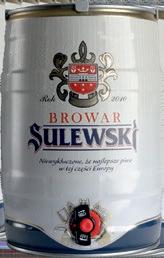


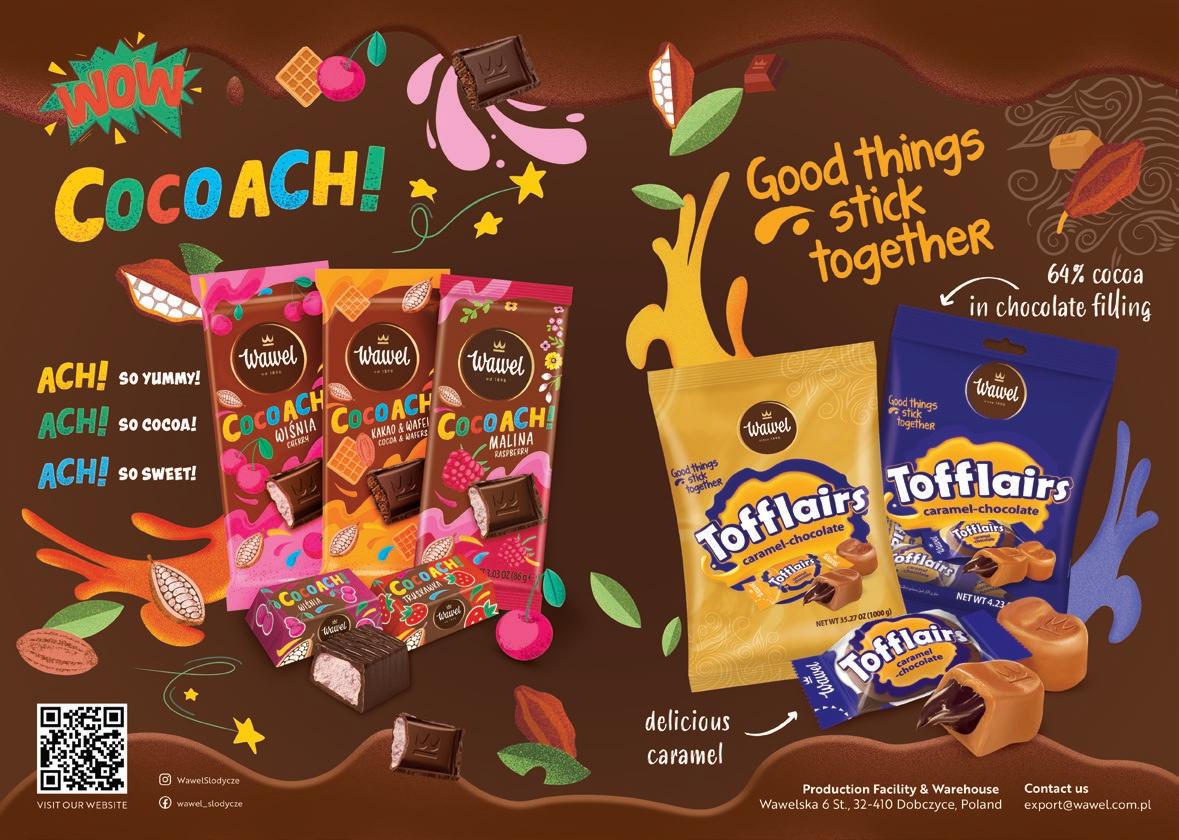













Polish food products hold an important and growing place on the international stage, bridging traditional flavors with modern demands. Their success is a testament to Poland’s rich agricultural heritage, commitment to quality, and ability to adapt to global trends. As international consumers continue to seek authentic, sustainable, and high-quality food options, Poland is well-positioned to maintain and expand its influence in the global market. Poland’s food exports have steadily increased over the years, thanks to its reputation for high-quality, flavorful,
interviews
24 Adam Mokrysz PhD, CEO and Katarzyna Mokrysz PhD, General Director, the Mokate Group
40 Małgorzata Cebelińska, Vice President of the Management Board of SM Mlekpol
44 Michał Sawosz, Chief Commercial Officer, Brand Distribution
88 Małgorzata Ryttel, CEO, Maxpol
90 Karol Pilaciński, Export Director, Bogutti
market insight
8 Export performance of agri-food products from Poland
16 Żubrówka vodka – 500 years and running even faster
76 What was 2024 like in the Polish FMCG sector?
food sector
28 Polish nutrition trends 2025
36 Poles’ appetite for health
48 The veggie generation, or the plant-based revolution
and authentic products. Today, Polish food can be found in major supermarket chains, specialty stores, and ethnic food aisles in countries across Europe, North America, Asia, and beyond.
This global availability reflects the growing demand for authentic Eastern European flavors and the recognition of Poland’s culinary heritage. Whether in the form of preserved goods, frozen meals, sweets, dairy or fresh produce, Polish food offers a slice of tradition to consumers worldwide.
52 Packaging – what does an informed consumer expect?
56 The confectionery market in Poland
66 Sweet and salty – snacks for everyone
commentary
11 Polish trade in 2025: challenges and opportunities
11 Forecasts for the Trade Sector in 2025
Editor-In-Chief
Tomasz Pańczyk t.panczyk@foodfrompoland.pl
Managing Editor Joanna Miziołek j.miziolek@foodfrompoland.pl
Advertisement Office
Phone: +48 22 847 93 67
Editorial Office Bagno Street 2/218 00-112 Warsaw, Poland Phone: +48 22 828 93 66 redakcja@foodfrompoland.pl www.foodfrompoland.pl
Fischer Trading Group Ltd.
CEO: Tomasz Pańczyk t.panczyk@ftgroup.pl


January-August 2024
During the first eight months of 2024, revenue from Poland’s agri-food exports remained slightly higher than a year ago.
In January-August 2024, the value of total exports of agri-food goods from Poland amounted to EUR 34.7 billion (PLN 150 billion) and was slightly higher (by 0.6%, EUR 0.2 billion) than in the corresponding period of 2023.
The share of agri-food exports in the value of total Polish exports in the eight months of 2024 was 15.1%, compared to 14.9% in the same period of 2023.
The performance of agri-food exports in the first eight months of 2024 was determi-
Polish foreign trade in agri-food products (billion EUR)*
*Data for 2024 refers to the period January-August.
ned by lower receipts from foreign sales to the largest recipients of domestic exports, namely: Germany, the Netherlands, Italy, Ukraine and the USA. A factor affecting trade performance was a less favourable euro and US dollar exchange rate for domestic exporters than in the corresponding months of 2023.
Imports of agri-food commodities to Poland in January-August 2024 amounted to EUR 23 billion (PLN 99 billion), 5% higher than a year ago. The higher growth rate in the value of imports relative to the growth rate of exports resulted in a decrease (by 7%) in the positive foreign trade balance, to EUR 11.7 billion.
The performance of agri-food exports in the first eight months of 2024 was determined by lower receipts from foreign sales to the largest recipients of domestic exports, namely: Germany, the Netherlands, Italy, Ukraine and the USA. A factor affecting trade performance was a less favourable euro and US dollar exchange rate for domestic exporters than in the corresponding months of 2023.
Imports of agri-food commodities to Poland in January-August 2024 amounted to EUR 23 billion (PLN 99 billion), 5% higher than a year ago. The higher growth rate in the value of imports relative to the growth rate of exports resulted in a decrease (by 7%) in the positive foreign trade balance, to EUR 11.7 billion.
As in previous years, agri-food products were exported from Poland mainly to the EU market. In January-August 2024, deliveries to EU countries generated a value of EUR 25.5
In 2023, there was an increase in receipts received from the export of agri-food products from Poland. The value of total exports of agri-food goods from Poland in 2023 reached a record 52.1 billion euros (238 billion zlotys) and was 10 times higher than in the year of Poland’s accession to the EU, while the positive balance of trade was more than 20 times higher than in 2004 and amounted to 18.7 billion euros (85 billion zlotys).
billion (PLN 110 billion), which represented a slight (by 0.5%) increase in relation to the same period in 2023. The share of the EU market in the export of agri-food goods from Poland was 73%.
Exports to the EU in the first eight months of 2024, as in previous years, were characterised by a significant geographical concentration. Germany remained Poland’s main trading partner. Exports to this country in January-August 2024 amounted to EUR 8.8 billion and were 1% lower than a year ago. The main exports to Germany were: tobacco products (EUR 1.4 billion, 37 thousand tonnes), fish and fishery products (EUR 935 million, 96 thousand tonnes), cereal grain (mainly wheat grain – EUR 215 million, 978 thousand tonnes and maize grain – EUR 168 million, 788 thousand tonnes), poultry meat (EUR 557 million, 195 thousand tonnes), pet food (EUR 556 million, 215 thousand tonnes), confectio-
Geographical structure of Polish agri-food exports in January-August 2024
nery (EUR 534 million, 82 thousand tonnes), meat, offal and preparations without poultry (EUR 488 million, 111 thousand tonnes) and bread and bakery products (EUR 465 million, 136 thousand tonnes).
Important recipients of agri-food products from Poland on the EU market were also:
• France – EUR 2.1 billion, 2% increase in revenue; exports mainly: poultry meat (EUR 363 million, 119,000 tonnes), processed meat (EUR 278 million, 65,000 tonnes), chocolate and chocolate products (EUR 134 million, 20,000 tonnes), bread and bakery products (EUR 114 million, 28,000 tonnes), beef (EUR 102 million, 17,000 tonnes) and pet food (EUR 84 million, 34,000 tonnes);
• Netherlands – EUR 2.0 billion, revenue down by 7%; exports mainly: poultry meat (EUR 258 million, 109 thousand tonnes), tobacco products (EUR 157 million, 12 thousand tonnes), cereal grains (mainly maize
–
EUR 64 million, 312 thousand tonnes and wheat – EUR 15 million, 57 thousand tonnes), beef (EUR 103 million, 22 thousand tonnes), chocolate and chocolate products (EUR 98 million, 20 thousand tonnes), pet food (EUR 64 million, 23 thousand tonnes), fruit and vegetable juices (EUR 60 million, 70 thousand tonnes), birds’ eggs (EUR 59 million, 38 thousand tonnes) and fish and fish products (EUR 56 million, 6 thousand tonnes);
• Italy – EUR 1.7 billion, 2% decrease in revenue; exports were mainly tobacco products (EUR 330 million, 15 thousand tonnes), beef (EUR 316 million, 55 thousand tonnes), fish and fishery products (EUR 162 million, 17 thousand tonnes), bread and bakery products (EUR 71 million, 14 thousand tonnes), pet food (EUR 54 million, 21 thousand tonnes), cheese and curd (EUR 54 million, 12 thousand tonnes) and chocolate and chocolate products (EUR 53 million, 6 thousand tonnes);
• Czech Republic – EUR 1.6 billion, 3% increase in revenue; exports mainly: poultry meat (EUR 174 million, 61 thousand tonnes), bread and bakery products (EUR 140 million, 54 thousand tonnes), tobacco products (EUR 103 million, 6 thousand. tonnes), pet food
(EUR 78 million, 37 thousand tonnes), cheese and curd (EUR 74 million, 17 thousand tonnes), pork (EUR 62 million, 17 thousand tonnes), chocolate and chocolate products (EUR 73 million, 13 thousand tonnes), and butter (EUR 52 million, 9 thousand tonnes).
In total, exports to the markets of the five countries mentioned above (Germany, France, the Netherlands, Italy and the Czech Republic) generated more than EUR 16 billion in revenue, which accounted for 47% of the value of total agri-food exports from Poland and 63% of the value of exports to EU markets in January-August 2024.
Agri-food products worth EUR 9.2 billion (PLN 40 billion) were exported from Poland to non-EU countries in January-August 2024, up by 1% year-on-year. The main exports were: dairy products (€1.1bn, down 2%), meat and nonpoultry products (€1bn, up 9%), poultry meat (€736m, up 17%), cereal grains (€643m, down 34%), bread and bakery products (€589m, up 1%), chocolate and chocolate products (€575m, up 17%) and tobacco and tobacco products (€557m, down 2%).
The largest non-EU recipients of agri-food
Commodity structure of Polish agri-food exports in January-August 2024
products from Poland were the UK, Ukraine and the US. In the case of the United Kingdom, the value of food exports from Poland in January-August 2024 amounted to EUR 2.8 billion (up by 1% y-o-y). Exports to the UK market were mainly poultry meat (€437m, 122,000 tonnes), meat preparations (€412m, 90,000 tonnes), chocolate and chocolate products (€263m, 52,000 tonnes), bread and bakery products (€214m, 49,000 tonnes) and pet food (€128m, 66,000 tonnes).
Revenues generated from agri-food exports to the Ukrainian market in the eight-month period of 2024 amounted to EUR 588 million, down 16% year-on-year. The main products sold to Ukraine were pet food (€62m, 33,000 tonnes), cheese and curd (€52m, 10,000 tonnes), sugar and glucose syrups (€40m, 5,000 tonnes), chocolate and chocolate products (€36m, 7,000 tonnes), coffee (€34m, 6,000 tonnes) and bread and bakery products (€27m, 7,000 tonnes).
Traders exported €489 million worth of agri-food products to the United States, 11% lower year-on-year. Exports were mainly chocolate and chocolate products (€75m, 6,000 tonnes), fish and fish preparations (€74m, 6,000

Maciej Ptaszyński President of the Management Board of the Polish Chamber of Commerce
The year 2024 in the Polish trade sector was marked by challenges as well as opportunities. Economic conditions, shifting consumer preferences, and new regulations significantly influenced the dynamics of this industry. The retail sector in Poland faced inflation, high energy and material costs, reduced purchasing power among citizens, and legislative uncertainty.

Renata Juszkiewicz President of the Board of the Polish Organization of Trade and Distribution
2025 promises to be another difficult year for the entire trade sector. Consumer sentiment can be described as similar to that of 2024. Trade has been struggling for a long time with many significant challenges, such as rising operating costs, high labor costs (including the increase in the minimum wage), inflation, weakened demand (2.5 million people below the poverty line), as well as unexpected legislative proposals. Due to the current situation and the declining purchasing power of Poles, we cannot expect a significant improvement in consumer sentiment.
Despite the difficulties, the largest retail chains are still striving to maintain low margins to provide consumers with the most favorable prices possible under the current circumstances. Rising con-
In 2024, the Polish trade market grappled with inflation, which directly impacted product and service prices. According to forecasts, inflation began to slightly decline in the second half of the year, yet it remained one of the primary challenges. Consumers exhibited increased caution in their spending, leading to decreased demand for luxury goods while driving interest in more affordable products, private labels, and items offering a better price-to-quality ratio. Changes in Polish shopping behaviors also compelled many companies to adopt greater flexibility in their strategies.
The year 2025 is expected to present the trade sector with further chal-
lenges but also new opportunities. It is anticipated that the macroeconomic situation in Poland will remain uncertain in the near term. However, with inflation stabilizing, the Polish trade market has a chance to continue its growth trajectory.
In summary, 2025 will be a period of both challenges and opportunities for the Polish trade industry. Companies will need to confront growing competition, evolving consumer preferences, and the complexities of the global market. This will be a time when innovation, adaptation to digital trends, and operational efficiency will be critical to achieving success.
sumer expectations also entail further investments in innovation. The trade sector needs stability, legal predictability, and no surprises from authorities in the form of unforeseen changes.
Investment areas will include the continuous development of sales networks, technological transformation, development of logistics infrastructure, integration of sales channels (omnichannel – integration of stationary and online sales), and process automation. Additional investments will also be related to the need to adapt stores to legislative changes and upcoming regulations, such as the implementation of a deposit return system, which is a significant organizational and logistical challenge, involving high costs, often requiring store reconstruction.
The biggest challenges for trade in 2025 will be maintaining an appropriate level of business profitability amid soaring costs, strengthening positions in a highly competitive market, and adapting to very costly legal regulations. In
a dynamically changing market, another challenge is efficiently adjusting the offer to the needs of increasingly demanding consumers. The bar is raised by slowing demographic growth, which is a significant challenge for the labor market and, consequently, the development of new technologies.
In the area of consumer trends, we can expect much more thoughtful purchases. Poles are counting their expenses more carefully and, due to rising living costs, are oriented toward greater savings. The economic situation forces consumers to look for opportunities and promotions, which is why their willingness to rotate between stores in search of the best deals will probably increase, creating an additional challenge in building customer loyalty.
In 2025, price will continue to play a key role in purchasing decisions, but it is also worth noting the growing importance of ecology and sustainable development, as well as the increasing awareness of consumers.


tonnes), meat and preparations other than poultry (€54m, 13,000 tonnes) and bread and bakery products (€45m, 5,000 tonnes).
Noteworthy is the large increase in revenue generated from the sale of agri-food products to the Turkish and Swiss markets. In the first eight months of 2024, exports of agri-food products to Turkey reached EUR 334 million, which meant a 35% year-on-year increase in the value of exports. Exports to the Turkish market were mainly beef (€194m, 35,000 tonnes), malt extract (€29m, 7,000 tonnes) and pet food (€19m, 11,000 tonnes).
Revenue from exports to Switzerland in the first eight months of 2024 increased by 52% to €279 million. The main exports to the Swiss market were: pet food (€45m, 13,000 tonnes), tobacco products (€45m, 1,000 tonnes), fish
and preserves (€42m, 3,000 tonnes), and alcohol products (€35m, 23,000 tonnes).
The commodity structure of Polish exports of agri-food products was dominated by meat, meat preparations and livestock. In January-August 2024, revenues generated from foreign sales of the aforementioned commodity group amounted to EUR 6.9 billion and were 5% higher than a year earlier, accounting for 20% of the value of all Polish exports of agri-food products.
Poultry meat (41% – €2,818 million), meat preparations (26% – €1,785 million), beef (23% – €1,560 million) and pork (8% – €570
million) accounted for the largest share of the export value of meat, meat preparations and livestock. Other meat species and livestock together accounted for around 2% of the export value share of this commodity group.
The second position in terms of value with a 12% share in agri-food exports from Poland was occupied by cereal grains and cereal preparations, whose total sales in January-August 2024, compared to the same period in 2023, decreased by 17%, to EUR 4.2 billion. Poland exported 6.8 million tonnes of cereal grain for €1.5 billion in the eight-month period of 2024. Within the export volume structure, wheat accounted for 57% (3.8 million tonnes, a 20% year-on-year decrease in export volume), maize for 26% (1.7 million tonnes, a 39% decre -

Commodity structure of Polish cereal grain exports from Poland in January-August 2024


Source: compilation by the National Support Centre for Agriculture on the basis of preliminary data from the Ministry of Finance
ase), rye for 7% (482,000 tonnes, a 41% increase) and barley for 3% (212,000 tonnes, a 36% decrease).
Exporters sent grain primarily to the EU market (3.9 million tonnes, 57% of grain exports). At the same time, 2.9 million tonnes of cereal grain were exported to non-EU countries, accounting for 43% of the export volume. In January-August 2024, wheat grain was sold mainly to Germany (978,000 tonnes, 25% of grain exports) and, among third countries, to Nigeria (734,000 tonnes, 19%), Angola (223,000 tonnes, 6%) and Cameroon (184,000 tonnes, 5%).
The main recipients of maize from Poland were Germany (788 thousand tonnes, 45% of this grain’s export) and the Netherlands (312 thousand tonnes, 18%), and from outside the
EU – Great Britain (207 thousand tonnes, 12%). Poland’s main export destinations for rye were Germany (294 thousand tonnes, 61% of that grain), Denmark (76 thousand tonnes, 16%), Spain (51 thousand tonnes, 11%) and the United States (22 thousand tonnes, 5%), and for barley – Germany (79 thousand tonnes, 37% of that grain exported), the Netherlands (52 thousand tonnes, 25%) and Algeria (33 thousand tonnes, 16%) and Ireland (11 thousand tonnes, 5%).
Foreign sales also included cereal products – mainly highly processed. In the eight months of 2024, revenues generated from exports of processed cereal products (including: flour, groats, malt, pasta, bread and bakery products) amounted to nearly €2.7 billion, 3% higher than a year earlier.
Increases in export value were recorded for: Sugar and confectionery (up 18%, to €2.8 billion), Coffee, tea and cocoa (up 15%, to nearly €0.9 billion), Fruit and preserves (up 7%, to €1.3 billion), Meat, preserves and livestock (up 5%, to €6,9 billion), fish and preserves (down 4%, to €2 billion), dairy products (down 2%, to €2.4 billion), tobacco and tobacco products (down 2%, to €3.7 billion) and vegetables and preserves (down 2%, to €1.8 billion).
Declines in export value, compared to the same period in 2023, occurred for: cereal grains and preparations (down 17%, to €4.2 billion), oilseeds and vegetable fats (down 16%, to nearly €0.9 billion), fruit and vegetable juices (down 2%, to nearly €0.6 billion) and alcohol (down 2%, to €0.5 billion).


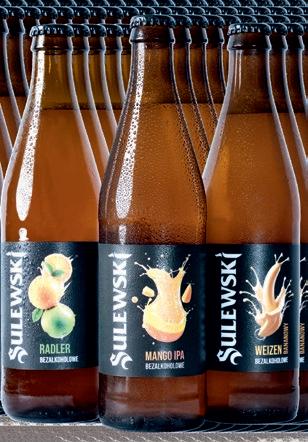

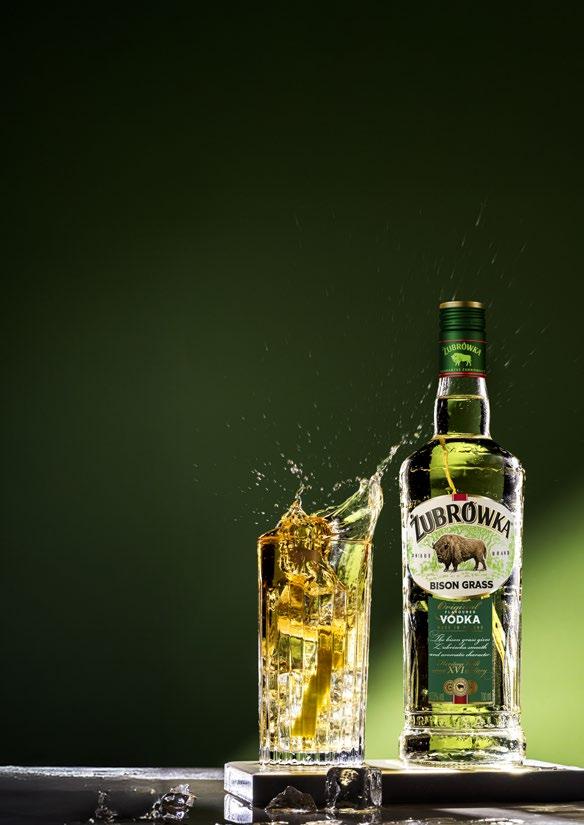
Żubrówka has been a constant companion for people, becoming part of Polish history and traditions. From ancient times, when bison grass was used in medicine and distillation, to the Middle Ages, when vodka with bison grass became a symbol of Polish nobility. Today, Żubrówka is the third best-selling vodka in the world and is constantly expanding its product portfolio to follow trends. It is changing to be always on trend, as shown by the latest relaunch of its two flagship products, Żubrówka Bison Grass and Żubrówka Biała, which have changed their iconic labels. What is the brand’s success based on and what makes it ‘Stand Up Again’ for generations?
The history of the Żubrówka brand is not only a story about vodka, but also about the history and culture of Poland. The first information about the brand dates back as far as the 15th century, when King Casimir the Great reigned on Polish soil. According to legend, it was during his reign that Polish alchemists discovered the secret of vodka distillation. A recipe for vodka flavoured with bison grass was known as early as 1534. We can find it in the herbarium written by Casimir Falimirz ‘Hortus sanitatis. About herbs and their power”, which contained almost 70 recipes for “smoking vodka from herbs”. The strong, grassy beverage has delighted the palates of rulers and commoners alike for years – and continues to do so to this day!
There was finally a new chapter in the centuries-old tradition of brewing ‘grassy’ vodka in the comfort of one’s own home. In 1894, ‘Żubrówka’ was registered as a trademark and its official recipe was created half a century later. It was developed by an eminent expert in vodka distillation, J. Dubiński. It still functions in an almost unchanged form today.
The uniqueness of Żubrówka Bison Grass is determined by the special place from which it originates – the surroundings of the Białowieża Forest – the wildest forest in Poland, so virgin it was put on UNESCO’s list of World heritage. In this inaccessible wilderness, bison grass grows – the most important ingredient of Żubrówka, which brings the unusual taste and smell of the forest to the table. The wildness of nature is thus embedded in the brand’s DNA. Żubrówka is oriented towards diversity and is always ready to create new and exciting experiences.
The taste of Żubrówka is not only herbal notes, but also creamy vanilla and delicate spices, with a soft finish of spring flowers. The aroma consists of complex aromas of bison grass, chamomile, green apples, lavender, vanilla and almond, as well as the freshness of citrus fruits.
For centuries, Żubrówka has consistently strengthened its position both in Poland and internationally. In a market where there were no flavoured vodkas, Żubrówka stood out with its unique product – Żubrówka Bison Grass. Today Żubrówka is the third best-selling vodka in the world, reaching consumers in more than 70 countries – including Japan, Australia, France, the UK and Germany. In Paris, at Harry’s Bar, where Bloody Marry was created, it is served on Żubrowka. This shows that the brand has a huge influence even on world classics.


DEVELOPMENT AT THE RHYTHM OF CHANGE
Żubrówka owes its success to continuous development and meeting consumer expectations – following new generations.
In 2010 Żubrówka has launched Żubrówka Biała – clear vodka, which from the beginning to this day is one of the biggest clear vodkas in the world.
Żubrówka Czarna is a super premium product that meets the highest distillery standards. This wheat vodka, owes its perfectly mild taste to the riches of the original nature.
Żubrówka Czarna is a variant based on a combination of excellent Polish wheat spirit and water from the purest springs of the Forest. However, the final character is given to it by the aging process in oak barrels. It stands out for its slightly warming, dry taste and full, oaky aroma.
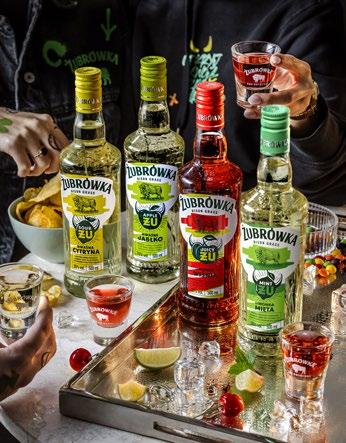
In recent years, the Żubrówka brand has made a number of innovations that confirm its readiness to follow the young generation and changing consumer needs. The introduction of new flavour lines dedicated to young adults, the refreshment of packaging design are only part of this process. The new brand communication strategy reflects a spirit of modernity and openness to new trends. And it emphatically says ‘We are not stopping and we are going for more’. Żubrówka has further ambitious plans for the future, which include not only new additions to the portfolio, but also the development of sales in more global markets.
In response to the growing popularity of flavoured spirits among Poles, four different flavour variants of Żubrówka Fresh Żu were created to satisfy the most demanding tastes of people who love interesting and refreshing flavours. Combining a note of craziness and dynamic lifestyle, the classic Żubrówka Bison Grass and fruity, refreshing flavours: Sour Apple, Refreshing Mint with Lemon, Sour Lemon and Cherry with Lime motivate their consumers to freely express their wild nature – celebrating authenticity, enjoying every moment.
The products in this line have a modern design, inspired by street art. The Fresh Żu line was also present at the biggest music festivals in Poland: Orange Warsaw Festival, Opener and Audioriver.
Responding to the needs of different consumers, Żubrówka offers ‘ready to drink’ variants in addition to its classics such as the cult Żubrówka Bison Grass, Żubrówka Biała or the aforementioned Fresh Żu line. Soda Żu is an alcoholic beverage in a can, which fits perfectly into the ready-to-drink trend. The convenient packaging allows you to take it wherever you want. The recipe is based on the iconic combination of Apple and Żubrówka Bison Grass – this original sin from Białowieża Forest paradise is called Apple ŻU and known around the world as a hero drink of the Brand. The canned version is lighter, fizzy and perfect for hot summers.

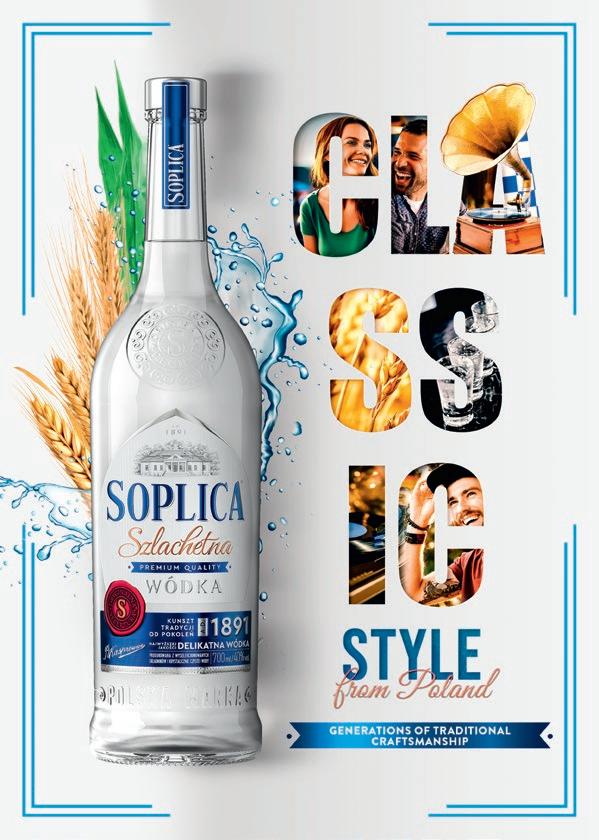
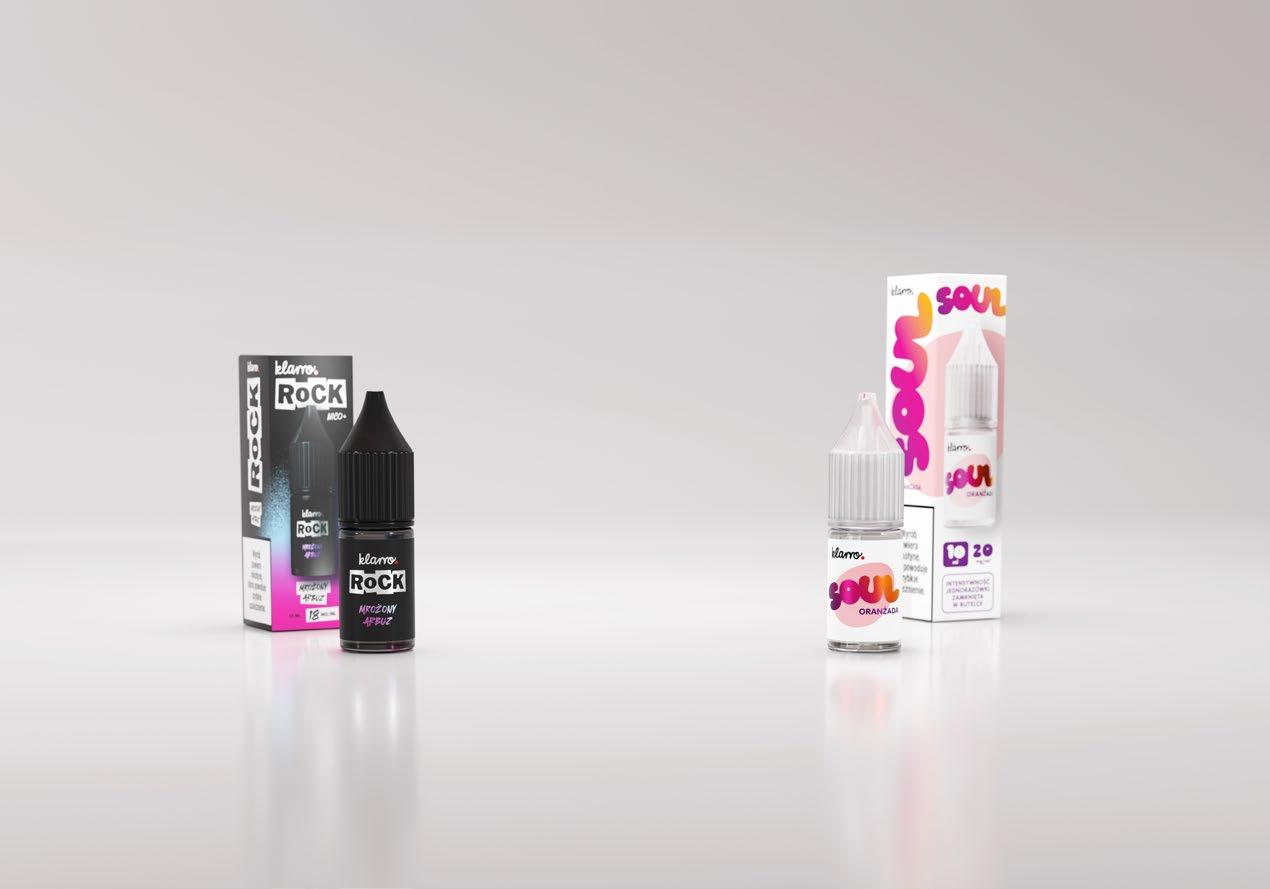

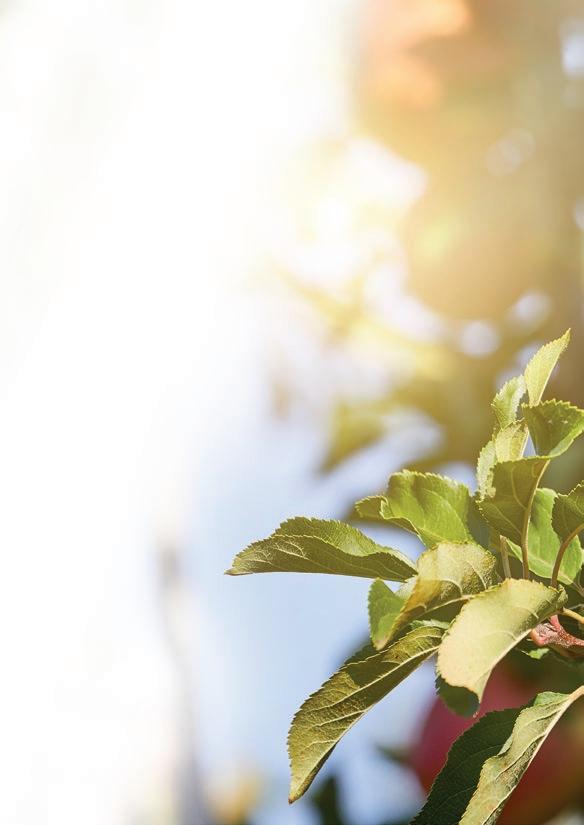
KOWR is a Polish government agency under the Ministry of Agriculture and Rural Development whose mission is to promote and support the export of Polish food products to international markets. All our activities are carried out under the motto „Poland tastes good” – a symbol of the quality, taste and potential of Polish products. In this way, we build lasting relationships between Polish producers and foreign importers, opening the door to mutual success.
Promotion at international trade fairs – Polish national stands are present at the largest agri-food events around the world.
Trade missions and networking – we connect foreign importers with Polish producers through inbound and outbound missions and matchmaking events.
Tastings and culinary demonstrations – we organise workshops, tastings and festivals to showcase the unique taste of Polish products.
Content support – webinars and conferences on business opportunities in the Polish market.
Access to the best products – from certified regional specialities to innovative and ecological solutions.
Reliability and quality – Polish producers meet the highest European standards.
Global potential – Polish products are exported to more than 190 countries.


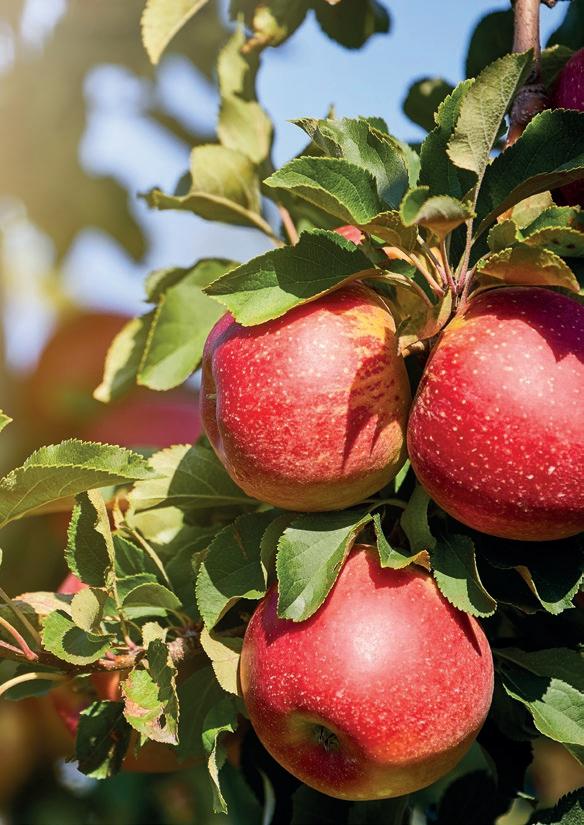




How to conquer the global market without losing a family soul
At the beginning of the 20th century, a small colonial shop in Cieszyn Silesia introduced local residents to the exotic tastes of coffee and tea. Today, the fourth generation of the Mokrysz family co-creates an international FMCG group that not only exports products to over 75 countries but also sets new trends in the industry. We talk with Adam Mokrysz, PhD, CEO of the Mokate Group, and Katarzyna Mokrysz, PhD, General Director, about a strategy that combines the strength of multi-generational tradition with a rapid response to the evolving expectations of 21st-century consumers.
Mokate has been shaped by four generations of the Mokrysz family. What advantages come from operating on a global scale while staying true to traditional family values?
Adam Mokrysz, PhD: The family character of Mokate is our greatest strength. It is not a random choice or an artificially created marketing strategy—it’s the foundation of our identity. Today, we achieve annual revenues exceeding 1.5 billion PLN and export products to over 75 countries worldwide, yet we remain guided by the
same values that inspired my great-grandfather when he opened his colonial shop in 1900.
Katarzyna Mokrysz, PhD: Vision, courage, and action—this is what allows us to boldly face challenges and achieve increasingly ambitious goals. This philosophy has brought us to where we are today. Of course, none of this would have been possible without the amazing people who help build the Mokate Group. We work with a professional team united by genuine passion and commitment to growth. Thanks
to this approach, we create products that meet consumer needs. We adapt quickly to changing market trends, which enables us to consistently strengthen our position in the international FMCG market.
What does it mean in practice for Mokate to be a family business? How does this idea manifest in the daily management of a company with four divisions and over 1,500 employees?
K.M.: Family businesses have many advanta-
ges that set them apart from corporations. We think in terms of generations, not quarterly results. This fosters stability and sustainable growth. We also strive to limit formalities to a necessary minimum. We avoid excessive bureaucracy and complicated procedures that could stifle the team’s creativity. Instead, we prioritize direct relationships and open communication. This ensures that every employee feels like an important part of the organization and knows their voice matters. It’s no coincidence that many of our employees stay with us for generations—often, the children and even grandchildren of our original team members work with us. We’re also a key employer in our region and actively support local community development, a commitment that has been with us for generations.
A.M.: Being a family business also means simplifying and shortening the decision-making chain. As a result, we can collaborate more effectively with partners—not only in Poland but also in distant countries. Our business model allows us to build close, long-term relationships, which enhances our credibility and speeds up subsequent stages of cooperation. This is particularly important in markets where business is based on direct relationships, such as in the Middle Eastern countries.
Speaking of which, Mokate creates brands well-known to Polish consumers, but exports are your biggest strength. What’s behind your spectacular international success?
A.M.: Indeed, as much as 80% of our production is destined for export. We are active in nearly 80 countries worldwide, from Europe to far-off markets like South Africa and the United Arab Emirates. The recognition and affection of consumers across multiple continents result from effective leadership, strategic thinking, and a focus on building lasting relationships in the business arena.
K.M.: We invest in technology, innovation, expanding our production facilities, and R&D. Our products are competitive in terms of quality and functionality. Each market has its own specifics and unique consumer expectations. That’s why we approach every market with openness and attention, seeking the unique “key” to unlock its potential. This isn’t always a B2C strategy. We also operate in the B2B sector, where our vending solutions, HoReCa offerings, and raw materials for the food industry are highly valued. Our state-of-the-art production facilities ensure maximum efficiency.
How did Mokate invest in its production facilities in 2024?
K.M.: Modernizing and expanding our production facilities is an ongoing process at Moka-
te—we understand that only by leveraging the most advanced technological solutions can we stay competitive with global leaders. One of our key investments in 2024 was automating production processes at our factory in Żory. One internal warehouse was transformed into a modern production hall, with its centerpiece being an innovative blending system that produces unique mixtures. With automation reaching 90%, we shortened order fulfillment times, and the entire upgrade also improved the efficiency of internal logistics.
A.M.: There’s also a lot happening in Ustroń. Here, we’re building a modern production facility focused on tea manufacturing. This ambitious project not only increases our production capacity but also marks another step toward reducing our carbon footprint by the end of 2025, when the facility will fully utilize renewable energy, and optimizing automation processes. In short, we’re investing with future generations in mind.
The Mokate Group is also visible at key international trade fairs. What does attending such events bring to your company?
K.M.: We aim to be where the “heartbeat” of international business can be felt. Trade fairs are the best opportunity to exchange experiences, build new business relationships, and strengthen existing ones—relationships that often turn into valuable long-term projects. This year, we were present at events like SIAL 2024 in Paris and GULFOOD in Dubai.
A.M.: Next year, we are preparing for more trade fair challenges. In 2025, we plan to participate in six events, including the 50th edition of the Foodex Trade Fair in Japan, the next edition of GULFOOD in Dubai, and the highly important Anuga Trade Fair in Cologne, one of key events for the FMCG industry. It will be an opportunity to showcase Mokate’s latest innovations to the world.
Looking back at your participation in GULFOOD 2024 in Dubai—the largest FMCG trade fair globally—how would you evaluate the event?
K.M.: We attended GULFOOD once again, this time with the Mokate Ingredients brand. It’s the best proof of our strong position in the international market. This year, we presented a wide range of products, from creamers and foaming agents to toppings, bases, and ingredients for the confectionery, bakery, and ice cream industries.
A.M.: Events like GULFOOD also provide valuable cultural insights. They’re an opportunity to understand trends and preferences in high-potential markets—both near and far east. This
perspective helps us systematically build Mokate’s position as a global FMCG leader.
What were the biggest achievements of Mokate’s Export in 2024, and what contributed to such impressive results?
A.M.: 2024 was a year full of success for us on international markets. We gained considerable popularity in the UK, where sales of our key brands saw significant growth. Additionally, Loyd tea experienced an impressive surge, underscoring Mokate’s growing potential in this category. Another important milestone was our expansion into new markets, such as Japan and Greece, where our products earned recognition in leading retail chains. All of this was made possible by our ongoing investment in innovation and the strengthening of our global partnerships.
K.M.: However, we never forget that people are the cornerstone of our success. In 2024, we expanded our team by bringing in new professionals who quickly became key players in executing our export strategy. Their fresh perspectives and expertise, combined with the experience of our existing team, create a powerful force driving our growth. Human resources are central to our success in international markets. The dedication and talent of our team enable us to innovate, adapt, and respond to challenges quickly. As we continue to grow, our staff will remain the foundation of our success, helping us navigate new markets and build strong partnerships worldwide.
What challenges does Mokate face in the coming years on foreign markets, and how do you plan to overcome them?
K.M.: Although our results in 2024 are very promising, the FMCG market is full of challenges that require flexibility and the ability to respond quickly. Above all, we need to tailor our strategies to the diverse needs of consumers across different markets. Understanding local trends and preferences is key. That’s why, in markets like Japan and Canada, we strive to be as open as possible to specific consumer demands and implement innovative solutions.
A.M.: In addition, we face challenges related to the further development of our distribution network. In countries like Romania and Moldova, we need not only to strengthen our position but also to establish partnerships with new collaborators. We know that the key to success will be continued investment in product development and the search for new distribution channels, which will help us maintain and increase our competitiveness on the international market.

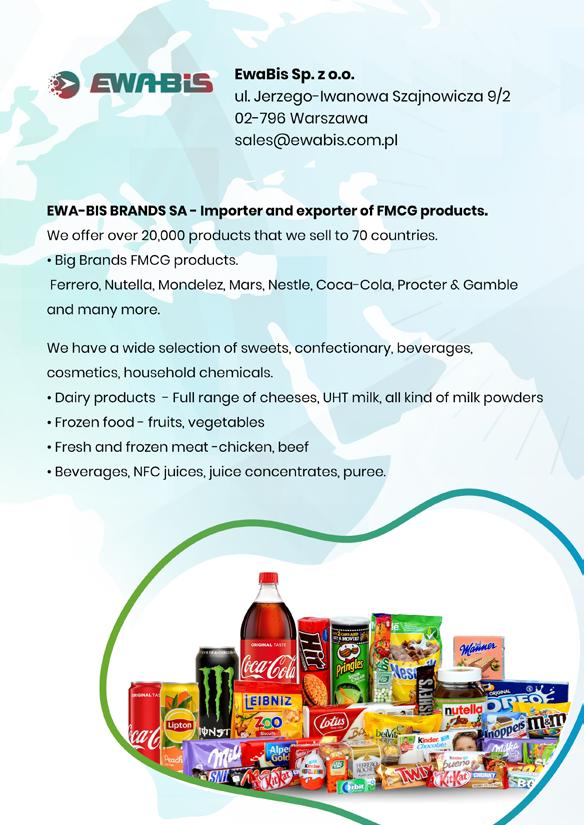

In the past year, we have seen trends such as wellbeing, clean label and flexitarianism. The growing awareness of Poles has prompted careful analysis of the composition of products, and the economic situation has forced many people to manage their finances more prudently, also when it comes to food categories. The coming year is a mystery to many, but expert analysis confirms that many of the current trends are likely to continue over the coming months, and some will gain even more momentum. So, what food trends will dominate in 2025?
„In a healthy body there is a healthy spirit” – a saying that has been known for generations perfectly describes current trends in the food market. Despite many impediments, such as new regulations or high prices of everyday products, Poles are meticulously choosing their food for the sake of their health and well-being. This is a trend that has dominated the recent ‚post-pandemic’ years and will be one of the main trends of 2025.
The grocery market in Poland is undergoing dynamic changes, with consumer preferences increasingly focused on health, ecology and conscious product choice. In 2025 the key trends that will shape the offer in shops point to the need to adapt sales strategies to meet new customer expectations.
„Growing health awareness means that functional and health-promoting products are becoming increasingly popular. Consumers are eagerly reaching for foods en-
riched with vitamins and minerals, as well as isotonic and protein drinks, which fit the needs of active people and those who care about a healthy lifestyle. The introduction of these types of products to the offer is a response to the growing trend of preventive health care,” points out Karolina Mańkowska, analyst at ASM SFA.
As the expert points out, another important direction is the interest in local and seasonal products. Consumers prefer short supply chains, which is evident in their choices. Thus, they support local farmers and suppliers. Seasonality – from being the weaker side has turned into the strong one. Choosing products that are only available for a certain period of the year has become a standard for conscious consumers. This is because they are oriented towards freshness and the origin of the products. „Updating the offer in line with the seasonal cycle and promoting local initiatives can significantly increase a shop’s competitiveness,” – Karolina Mankowska adds.
As in previous years, we may be experiencing dynamic growth in the plant-based food market. „Alternatives to meat and dairy, based on legumes, mushrooms or algae, are finding more and more followers, both among vegans and vegetarians, as well as people who limit their consumption of zoonotic products. The offer in this category should be diverse and innovative in order to respond to consumer expectations of a healthy and sustainable lifestyle,” points out the ASM SFA expert.
Zero waste is also an interesting theme. It combines both environmental and economic concerns, as well as a social dimension – considering the problem of hunger in many parts of the world, but also in our own backyard, as many people even in Europe are undernourished and suffer from hunger.
„The zero waste trend and sustainable packaging are playing a big role. Customers are keen to choose products without packaging or in eco-friendly, biodegradable ma-

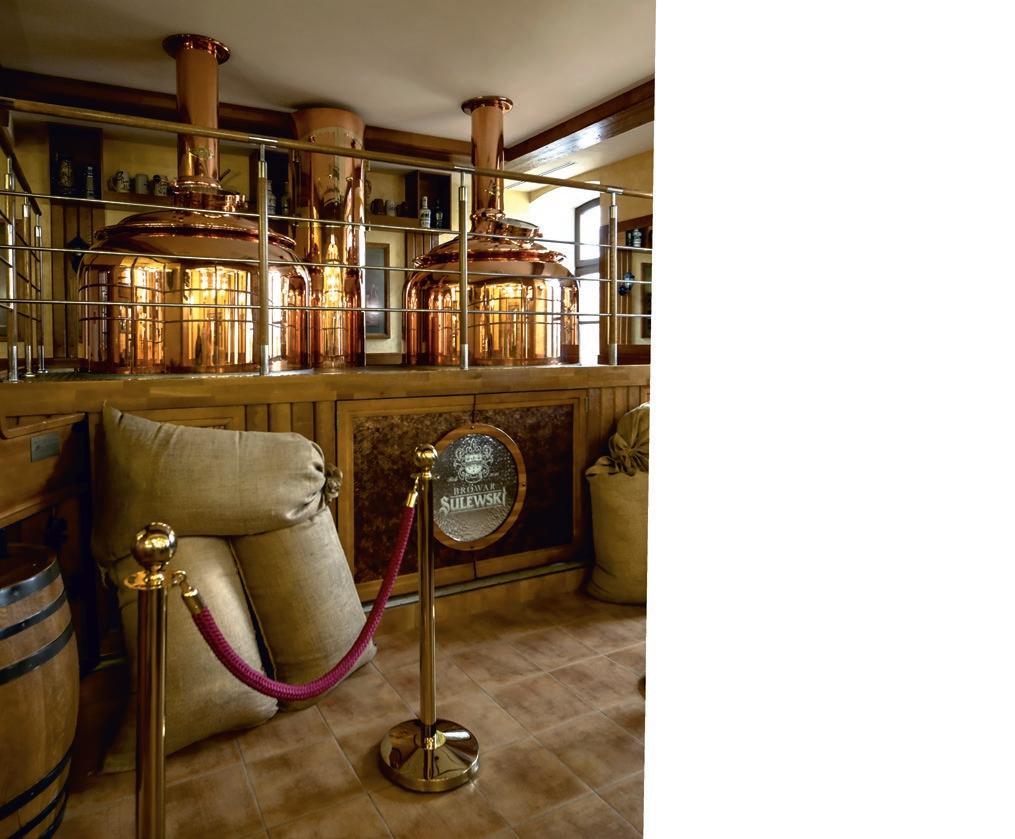





There is also growing interest in items made from ‚ugly’ fruit and vegetables, which fit in with the idea of not wasting food. Promoting such solutions is not only a pro-environmental measure, but also a response to the needs of thrifty and conscious consumers

terial. There is also growing interest in items made from ‚ugly’ fruit and vegetables, which fit in with the idea of not wasting food. Promoting such solutions is not only a pro-environmental measure, but also a response to the needs of thrifty and conscious consumers” – explains Karolina Mankowska.
The aforementioned social aspect is linked to problems that affect the entire economy. This is why it is so important to be able to act in a crisis in such a way that its effects are felt as little as possible. ASM SFA’s expert points out that the current economic challenges, such as inflation or problems related to global crises, influence consumers’ purchasing decisions.
„Priorities are changing – the popularity of cheaper alternatives and base ingredients is growing, prompting customers to prepare their own meals. At the same time, global problems with importing selected products may increase the importance of local substitutes, which is an opportunity for domestic suppliers and producers,” –explains Karolina Mankowska.
Analytically, ASM SFA forecasts that 2025 will bring a further development of the trends that are already shaping the FMCG market today. Consumers expect products that are healthy, organic, func -
tional and tailored to their individual needs – so these will largely be created by companies. And those who respond first –manufacturers and retailers alike – will win customer loyalty and strengthen their position in a competitive market.
Researchers, on the basis of deep, multiyear research and analysis, try every year to predict what the next few years will look like. Many trends from previous months hold, but the environment always dictates what is new. According to Mintel’s predictions, four trends will be key for the food industry in 2025: Fundamentally Nutritious, Rule Rebellion, Chain Reaction and Hybrid Harvests.
The first trend cited relates to the relationship with food – reaching for food will be coupled with attention to health. „The emergence of GLP-1 drugs and their role in weight loss and weight management will inspire global consumers to rethink the relationship between food and medicine. In parallel, as confusion grows around what is healthy and what is not, brands will seek to simplify their health promises, focusing on promoting simple-to-understand benefits and key nutrients,” points out Honorata Jarocka, Principal Analyst at Mintel.
As the expert emphasises, information
on the packaging will play a key role in consumer choices. Data on the content of protein and fibre, as well as vitamins and minerals will attract weight-loss medicine users, for whom balancing nutritional needs will be a priority, claims Honorata Jarocka. It will also send out a strong message to consumers who structure their menus according to their individual needs or moods. Therefore, many innovations can be expected in the segment of products rich in essential nutrients. So that their consumption is associated with improved health, both in the short and long term.
The trend, described by Mintel as a ‚rebellion against the rules’, is supposed to mean, in practice, a break from established patterns of what a product and its consumer should look like. Now, the thinking and creation of new articles is to go beyond the usual standards, and food brands will focus on the real needs of consumers when designing innovations – what their consumers actually eat and drink.
„Brands will be more in tune with how consumption actually is rather than how they feel it should be. Supporting the rebellious tendencies of open-minded consumers who want to break the mould, brands

should be more creative in their approach to innovation, experimenting with things that go beyond the norm. Brands in their communication may also seek more often to break the social taboos surrounding less publicised health issues. One important space, among others, remains the role of food and drink in managing mental wellbeing,” explains the Mintel expert.
We can therefore expect creative ideas and interesting innovations. And we will be inspired above all by the next generation of consumers, who are known for their openness in expressing their views, and for having a great deal of agency in the process.
Sustainability, ecology, recycling or decarbonisation are concepts that have taken on a deeper meaning in the last year. They are no longer just an idea, but a pillar of activity for almost all producers in the food market.
„Increasingly, frequent production challenges related to climate and geopolitical events are not only affecting the price of the shopping basket, but also increasing consumer awareness of how more, and less distant world events may affect their eating style. In a volatile world, food brands should communicate more frequently on
how they are adapting to changes in local and global sourcing of ingredients and the benefits to consumers by doing so. Greater cross-sector and international collaboration will be required, as well as an emphasis on scalable technology solutions. Looking ahead, more ingredients will be sourced from alternative and potentially more reliable growing regions, while consumer identities will be even more strongly shaped by social media, immigration and travel,” comments Honorata Jarocka.
That green business playing a huge role in shaping the FMCG market has become a reality. Companies report widely on their activities in this area, trying as hard as possible to support keeping the natural environment in good condition. Regenerative agriculture, which not only benefits in higher yields, but above all preserves biodiversity, is becoming an interesting thread.
Artificial intelligence has become an everyday tool used in almost every industry and at almost every level. AI is evolving at a staggering pace improving practically day by day.
„The increasing use of technology in food and beverage production is a scenario whose inevitability is primarily due to challenges within the supply chain. This may
cause concern on the part of some consumers, hence brands should prioritise greater transparency and focus on communicating health benefits and advantages. Importantly, technology should be presented as complementing nature and enhancing the natural. New technologies need to be humanised and brought closer to consumers in an accessible way, while increasing acceptability for new solutions, including developing the role of AI in the food industry,” points out Honorata Jarocka of Mintel.
Artificial intelligence, used judiciously, can streamline many processes in companies, including those requiring creative thinking. Other modern technologies also contribute to the industry. However, the complete replacement of humans is not yet being considered as a possible scenario. We should consider the development of technology as support and a unique tool, for the 21st century.
2025 will certainly be a period of change in technologies – which will be tailored to individual needs. The colour green will be a symbol not only of plant-based cuisine, but also of the whole process of sustainable production that producers will strive for. The younger generations will dictate the terms, and the older ones will certainly be inspired by the courage of the young to express their preferences.



The slow food trend is making consumers aware of the importance of quality food – unprocessed, sourced from local entrepreneurs and full of nutrients – for the body. More and more Poles want to eat healthily, which is why they choose products from shop shelves that have a positive impact on their body, mood or appearance.
According to the report „Healthy eating according to Poles 2024”1 , Poles most commonly associate eating healthy with eating plenty of vegetables and fruit. More than one in three people see it as avoiding ‚chemicals’, processed foods, drinking plenty of fluids or limiting sugar. Consequently, Poles are making changes to their menus, increasing hydration, fruit and vegetable intake, limiting sugar and the consumption of processed foods. They are choosing plant-based products or those with extra fibre content. And all with the aim of providing the body with essential nutrients to support brain function and improve mood. On the other hand, products that can cause blood sugar fluctuations, inflammation, irritation or fatigue are eliminated from the menu.
Healthy eating is important to the majority of Poles. This was confirmed by as many as
80% of respondents in the Inquiry report. It is regarded as a completely unimportant issue by only 4% of countrymen. Among the main reasons why it is important, respondents most often indicated staying healthy – 53% of responses. This was followed by wellbeing (20%). Of lesser importance is losing weight and reducing weight – 9%, physical condition – 8%, appearance – 5% or doctor’s recommendations – 4%. As declared, Poles are already taking steps to put healthy eating into practice. 34% drink plenty of fluids, 33% eat more fruit and vegetables, 33% limit their sugar intake, 30% avoid preservatives, colourings and enhancers in food, 27% avoid processed food, 21% keep a balance and eat everything in reasonable quantities, 20% eat a varied diet. Among the ways used daily, Poles also declare that they pay more attention to the quality of the products they choose (20%), avoid stimulants such as alcohol or coffee (17%) and limit their salt intake (16%).
Following on from these declarations, Inquiry in its research also asked Poles whether they were currently following any particular diet. Responses in the report indicate that 14% of respondents are limiting their meat intake, but not giving it up completely. 11% have introduced a calorie-reducing diet with no restrictions on products. The same number of respondents follow a diet containing as many healthy products as possible, without restrictions. 8% follow a diet for people with diabetes, hypertension or other conditions. 5% follow a weight loss diet, according to the recipes provided. Also 5% follow a meat-free diet, allowing fish and seafood. 4% have implemented a vegetarian diet, 4% exclude dairy, 3% a vegan diet, 3% a boxed diet and 3% a gluten-free diet.
Many people have plans to go on a diet, and the most popular are those for weight-loss – indicated by 34% of respondents. This is followed by those that reduce calories, without excluding any products – 31%. The
podium is rounded off by a diet containing as many healthy products as possible, without restrictions – 24% of indications.
Unfortunately, certain factors sometimes discourage healthy eating. According to the Inquiry report, the most common factor is the high price of healthy products – 45% of respondents say this. On the other hand, 31% admit that the large number of different temptations can be discouraging. 25% note that unhealthy products are often tastier and 22% anticipate difficulties in changing bad eating habits. Interestingly, 19% indicate a lack of confidence in manufacturers doubting they actually offer healthy food.
In addition, consumers point to lack of information about what is actually healthy food or lack of trust in the certifications given to it. Accessibility is also an issue, with 11% of respondents citing poor availability of healthy products.
More and more public institutions are promoting healthy eating. One of them is the Polish Chamber of Organic Food (PIŻE), which conducts educational activities encouraging the introduction of BIO products to the daily menu of children and young people, not only at home, but also in mass catering. She points out that this is a step that will positively influence more conscious and responsible eating decisions of future generations. As Krystyna Radkowska, president of the Polish Chamber of Organic Food, admits, it is the responsibility of adults to guide a young person through adolescence, to instil the right values, to sensitise and support them in their preparation for adult life. „If we skilfully, from an early age, teach children the importance of the role of the individual in the fight to protect our shared planet, the importance of making conscious consumer choices, we will succeed in raising a ‚Euro -Leaf generation’ – people responsible for the future of future generations, realising that there is no Planet B. Action is needed here and now,’ emphasises Krystyna Radkowska, President of the Polish Chamber of Organic Food. Euro-Leaf is the label for organic products, a sign of good food that is free of pesticides, antibiotics and growth hormones.
33% of respondents buy sugar-free products and 21% buy organic and BIO products. 17% reach for lactose-free items, 10% with the Fairtrade label

Health has more than one name Which products count as healthy food? Certainly, those that are the least processed, without preservatives or – as the case may be – sugar, lactose or gluten. The report „Healthy eating according to Poles 2024” shows that 33% of respondents buy sugar-free products and 21% buy organic and BIO products. 17% reach for lactose-free items, 10% with the Fairtrade label, i.e. produced according to fair trade principles. Gluten-free products are reached for by 9% of respondents, wheat-free by 8%, dairy-free by 6% and nut-free by 5%. Meat-free diets are also popular, with plant-based products gaining ground. The choice of this type of diet is most often due to ecological, humanitarian, ethical, health or religious factors. Among the health reasons, the motive is to keep the body fit and in good general condition and to maintain body weight at the right level. Plant-based products are rich in vitamins, minerals, fibre and antioxidants necessary for the body to function properly. They are already available on the market in many product categories, as
substitutes for dairy or cold cuts. A study by Inquiry indicates that already 26% of Poles occasionally choose plant-based yoghurts and desserts, such as soya or coconut. Plant-based drinks, such as soya or almond drinks, are reached for by 23% of respondents. Meatless ready-made dinner dishes, such as meatballs, lasagna or cutlets, are occasionally consumed by 16% of consumers. Slightly fewer also occasionally reach for meatless pâtés, cold cuts, sausages, plant-based meat substitutes, vegan yellow cheese or vegan margarine. Plant-based meat or dairy substitutes are not bought at all by 45% of respondents.
However, among drinks, 100% juices are considered the healthiest. Around one in ten people consider sugar-free nectars and fruit drinks without added sugar to be healthy.
The fashion for healthy eating continues –a trend that will not lose its popularity. Healthy food shelves in shops are already a staple. The only thing to do is to update them in line with novelties and consumer preferences. One thing is certain – Poles have an appetite for health!


Małgorzata Cebelińska
Vice President of the Management Board of SM Mlekpol

The year 2025 promises dynamic changes in the dairy industry, driven by evolving consumer expectations and global challenges. Health-focused products, sustainability, personalized offerings, and technological innovations will shape the market. How is Mlekpol, a market leader, responding to these demands by expanding its product portfolio, investing in sustainability, and strengthening its global presence?
Dairy is one of the core FMCG categories – what trends will dominate the dairy industry in 2025?
The year 2025 will bring us a continuation of the key trends that have developed in recent years. Consumers will therefore seek products that support their health, with simple ingredients and a short label. There will also be an increase in the importance of brands that focus on sustainable production, including not only eco-friendly packaging or green energy, but also corporate governance and positive relations with the local community. Another factor shaping the market in 2025 will be the move towards personalised offers. We predict that the category of functional products, such as high-protein, on-the-go or comfort food, will grow. Due to the strong influence of social media and the home cooking trend, traditional products such as cream, butter and yellow cheese, which are a staple in the cuisine of many countries and nations, will also strengthen their position.
In which direction are you currently developing your offer? Which segments will you be focusing on in the near future?
In 2024, we launched around 20 new products, mainly under the Łaciate brand. Our offer includes, among others, the line of high-protein products Łaciate Protein+, Łaciate kefir, Łaciate cottage cheese, desserts with buttermilk, Łaciate barista UHT milk
and new flavours of Łaciate whipped cream cheese. In the coming months, we plan to expand the portfolio further with protein products and butter with improved nutritional characteristics – with added phospholipids and vitamins D3 and K2. This is in response to the expectations of today’s consumers, who are increasingly willing to reach for products that offer added value in the form of higher protein, vitamin or mineral content.
Mlekpol’s portfolio includes a whole range of iconic brands and products. What is their popularity in individual countries? How do you ensure their continued popularity?
Our export hit is the Łaciate brand, present on six continents, particularly popular in China and the Philippines. The main products going to distant markets are UHT milk and powdered products. We also send cheeses, butter, cottage cheese and fermented products abroad. To meet the expectations of foreign markets, we have also created two export brands: Milcasa and Happy Barn. We build the popularity of Mlekpol’s products abroad by, among other things, being present at the most important and largest food fairs in the world. These include Gulfood in Dubai, SIAL Paris or Anuga in Cologne. Participation in such events is an opportunity for the Cooperative to present its offer, establish new business contacts and learn more about the needs of our foreign customers.
The company’s offer also responds to changes in consumer preferences or new trends. Among others, Mlekpol offers a range of protein products. How has the line been received and is its development planned?
The Łaciate Protein+ line has been very positively received by consumers and customers. Currently, on shop shelves you can find drinking yoghurts: natural, mango and strawberry, kefir and UHT classic and lactose-free milk. Interestingly, the audience for these products is wide and not limited to athletes. Of course, protein-rich products ensure faster recovery after exercise, but they are also a way to supplement the daily diet and an idea for a healthy meal at work or on the go. Thanks to their convenient packaging with a screw cap, they fit into the category of on-the-go products. Protein milk, on the other hand, is a great addition to your morning coffee, oatmeal, smoothie or pancakes. With an extra portion of protein, such a meal gives you a feeling of satiety for longer. Already in 2025, we will launch other products from the Łaciate Protein+ line and we hope they will be met with similar interest.
An international trade fair is a forum for business meetings and a chance to meet contractors in person. What message would you like to send to your current and future partners?
The modern world is facing many adverse political and economic phenomena, as well as the consequences of climate change. International trade in such conditions is therefore a challenge that Mlekpol, thanks to its flexibility, is able to meet. We have 14 modern processing plants, and we are investing in the green transformation of them, automation and digitisation of processes. In addition, we have an extremely extensive portfolio of high quality products, made from world-renowned Polish milk. Our Cooperative is made up of nearly 8,000 farmers whose farms are continuously modernised and whose animals are provided with the right level of welfare. For years, we have also been developing export and delivering products even to the most distant markets. All this reinforces Mlekpol’s image as a trusted partner with whom you can build long-term trade relations.
You export to more than 100 countries worldwide. In which countries do you have the widest distribution?
Today, our key export destinations include most of the European Union countries, as well as the United Kingdom, China and Ukraine. Recently, we have also been strongly developing sales to countries such as South-East Asia, the Middle East and Latin America. These are regions which, for various reasons, are characterised by insufficient domestic production and, on the other hand, by positive demographic indicators which result in increased demand for dairy products.
The plants in which you produce are distinguished by a high degree of specialisation and modern machinery. What elements are key to production safety and efficiency?
The highest quality raw material and the short processing time are key factors that influence the taste and safety of our products. Milk from Mlekpol suppliers is subjected to detailed laboratory analysis and processed on the day of collection. As a result, the products are distin-
Our Cooperative is made up of nearly 8,000 farmers whose farms are continuously modernised and whose animals are provided with the right level of welfare.
guished by their simple composition and clean label, without the need for preservatives or unnecessary additives.
All production processes and finished products are monitored according to national regulations and international standards such as IFS and HACCP. In addition, the company’s factories have Kosher certificates, allowing cooperation with the Jewish community, and Halal certificates, allowing products to be sold according to Islamic principles. All this enables Mlekpol to provide consumers with fresh, natural and safe dairy products of excellent, repeatable taste and the highest quality.
Caring for the environment and conscientiously pursuing sustainability is one of the pillars of the company’s current strategy. What measures are you taking in this regard?
In this regard, Mlekpol has a sustainability team working on the preparation of the first non-financial ESG report. As early as 2025, we plan to publish a preliminary report showing how we are meeting our targets for CO₂ reduction, investments in green energy, corporate governance and relations with the external environment.
Our strategy is based on four pillars. We started with the abandonment of hard coal, and we are currently implementing a number of investments related to the construction of cogeneration systems or further biogas plants. We are also working on the rational use of energy and investing in production automation. The green transformation extends not only to our production facilities, but also to the farms of our suppliers, who are increasingly bold in investing in renewable energy or seeking beneficial solutions in regenerative farming practices.
What plans does your company have for the coming year? What are the most important objectives?
Our main objective will continue to be to maintain good relations with our suppliers and to guarantee them a price that allows profitable production and further development of the farms. In addition, we will continue to make a number of investments in individual production facilities. In 2024 alone, we spent more than a quarter of a billion PLN on this, 80 million PLN more than in the previous year. We also plan to systematically expand our product portfolio so that it meets the needs of modern consumers even better. In addition, among Mlekpol’s priorities is greater international expansion, consisting of strengthening current trade relations, but also gaining new markets.
Thank you.
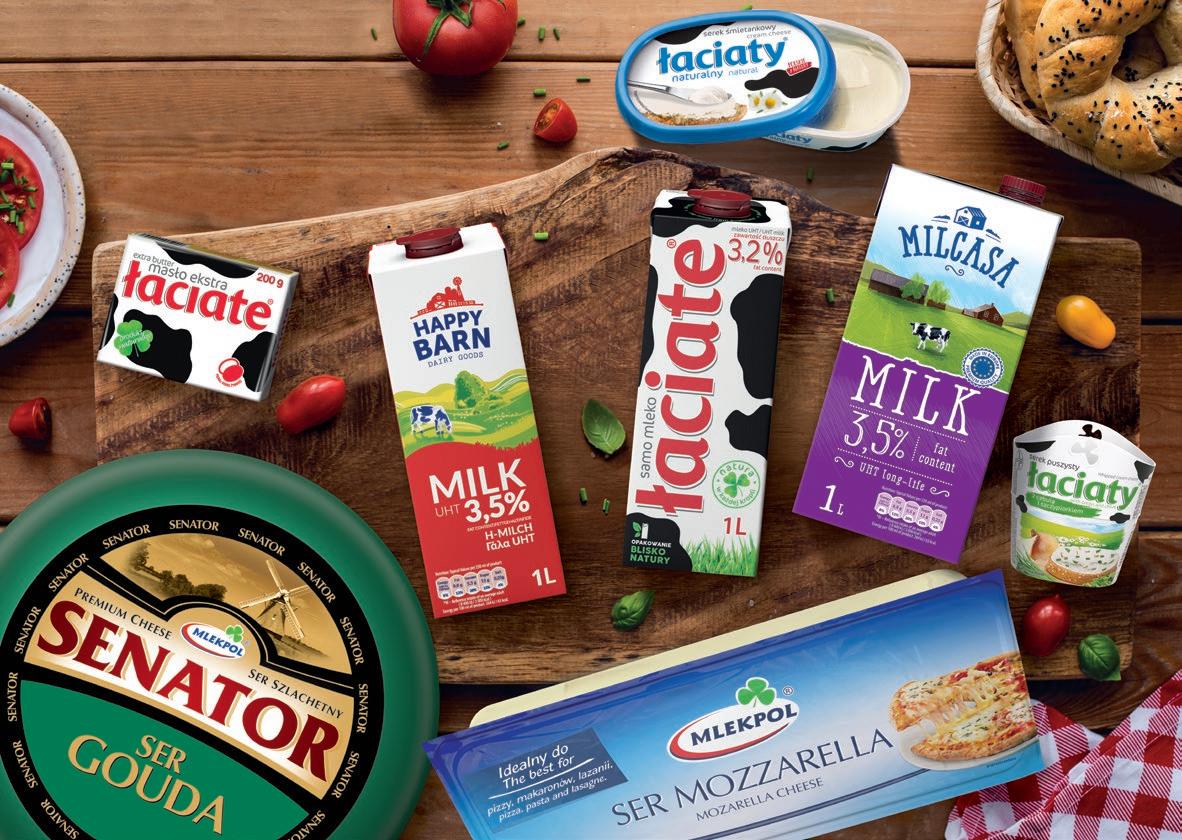


Michał Sawosz Chief Commercial Officer, Brand Distribution
Michał Sawosz, Chief Commercial Officer of Brand Distribution, shares insights into the company’s three-decade journey, its unique Full Service Distributor approach, and its ambitions to lead in both global and domestic markets.
Brand Distribution is a company that has been on the market for more than 30 years. Please tell us about its business profile and offer.
Brand Distribution is a family-owned company with many years of experience in the import and export of FMCG products, serving more than 100 markets on 6 continents. We are also active in domestic distribution, believing in the growing potential of local markets. This direction of the company towards Full Service Distributor (FSD) will be an increasingly important part of our growth strategy. Our offer is complemented by full logistics, marketing and private label services, allowing us to comprehensively support the development of each brand - from market research to warehousing to distribution through various sales channels. We want to show our suppliers our willingness and ability to take responsibility for their brands in the domestic market. This is our ambition.
Some of the services you provide include import, export, logistics, market research, marketing, distribution, warehousing and even private labeling. Which function do you focus on the most?
Our biggest focus is on distribution and brand developmentboth existing brands and those we create from scratch. Everything else, such as warehousing or market research, is a strategic support for us, but it is the launch of new products and their comprehensive promotion that is at the heart of our business. This year, we have been able to secure spectacular contracts that will help us get to the next level. The best example of this is the agreement for the Takis snack brand, with Barcel, part of the global food market leader Bimbo Group.
What was 2024 like for Brand Distribution? What challenges did it present to you and how did you deal with them?
Flexible processes and close cooperation with partners allowed us to maintain continuity of supply and introduce new product lines. At the same time, we invested in developing our warehouse infrastructure, which increased our operational efficiency.
You are present on six continents, in more than 100 markets. Which export destinations are you currently developing? In which countries have you achieved a good position?
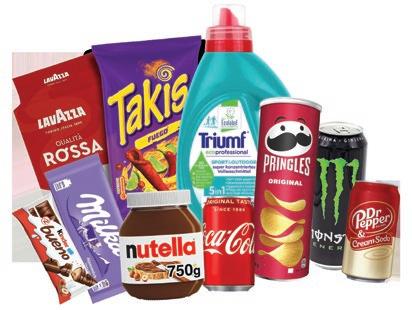
We are currently most focused on further expansion in Southeast Asia and South and North America, where we see strong growth potential. We have developed a stable position in EU countries and the Middle East, where our brands are already recognised and valued. We are significantly strengthening our presence in the domestic market, which we see as an important growth area.
How do you develop an offer for such diverse markets? Do you manage to anticipate trends in individual countries?
When building our offering, we combine in-depth trend analyses with direct dialogue with local partners. This enables us to understand the preferences of customers on different continents and to react well in advance. We also track consumer behaviour online, which helps us quickly verify the potential of new products and adapt the range to local tastes.
More and more consumers are paying attention to sustainability and corporate social responsibility. What activities are you currently carrying out in this area?
We take a serious approach to these issues, which have found their place in our company culture and values for years. We treat with respect the implementation of ESG elements in our operations, which are part of the strategy of our business partners - suppliers and customers.
How important is it for a company to participate in international trade fairs?
An international trade fair is a unique opportunity for personal meetings that nothing can replace. It is an opportunity to build mutual trust - the most valuable value in life and business. Especially in a family business.
How are the company’s plans for 2025 shaping up? In which direction will Brand Distribution grow and what investments do you plan to make?
We are finalising the Brand Distribution group’s three-year strategy. I hope we will soon have the opportunity to show it to the market.
Thank you.



Nearly 47% – that’s how much sales of plant-based products have increased over the past few years 1. Also, market trends show that the category’s popularity will continue to gain momentum. According to GfK 2 data, the lion’s share of new consumers of products in this category are residents of small and medium-sized towns. The trend is supported by the increasing availability of plant-based products, as well as a wide range of variants.
The change in eating habits is, among other things, an aftermath of the pandemic and a turn towards taking care of one’s own health. The topic of food intolerances has
Consumer trends dictate how the market evolves. One powerful trend today is the turn towards plant-based diets or partially replacing meat with veggie equivalents. Manufacturers have more and more on offer for the discerning modern consumer. 1
strongly influenced the activities of manufacturers and the development of their offer to meet specialised nutritional needs. Lactose intolerance, for example, is one example of these, resulting in a sizeable category of dairy substitutes.
The growth of the plant-based food segment is also supported by the aspect of awareness, the need to move towards organic production and to make sustainable purchasing choices. Meat production generates significantly higher CO2 emissions and more water has to be used. Hence, even a partial switch to a plant-based diet can reduce the negative impact on the environment.
The plant-based era is upon us
You don’t have to be a vegan or vegetarian to be keen on plant-based products. Consumers, aware of the impact of meat production on the planet and the environment, are trying to limit their consumption of animal products. Such a diet, due to its flexibility, has gained a sizeable following, referring to themselves as flexitarians.
When one member of the family changes their eating habits, their diet quickly transfers to the rest of the household as well. This is especially true if the new way of eating has been chosen by the person responsible for shopping and preparing meals.
Plant-based drinks have become a hit on the vegetarian shelf. Such dairy alternatives – according to NielsenIQ – generated more than 90% of all category sales in 2023.
According to GfK – in the last five years, the percentage of households in Poland with plant-based products has almost tripled. Just a few years ago, it was 11.5 per cent, and in 2023 it grew to 31.7 per cent (period July 2022-June 2023). GfK calculations show that between July 2022 and June 2023, more than 400,000 households reached for products in this category.
This market is growing rapidly. Meat or dairy companies are very keen to add plant-based products to their offer in a bid to open up to the growing group of consumers choosing vegetarian items. In addition, looking at NielsenIQ research on behalf of Danone, it is clear that the category is maintaining double-digit growth – both in value terms (up 17.2% year-on-year) and in volume terms (up 14.7% year-on-year).
Plant-based drinks have become a hit on the vegetarian shelf in every shop. Such dairy alternatives – according to NielsenIQ data –generated more than 90% of all category sales in 2023. Of these, oat and almond drinks proved to be the most popular variants.
„The category of plant-based dairy substitutes, although still relatively small, is growing year on year. Between April 2023 and March this year, the value of its sales increased by as much as 23% compared to the same period a year earlier. At the same time, it is worth noting that these increases are not primarily driven by rising prices – the number of packages of products in this category also went up, by as much as 17%,” emphasises Nikodem Pankowiak, sales data analyst at the CMR Institute.
It is worth noting that plant-based dairy substitutes are a category that relies primarily on plant-based drinks – these accounted for as much as two-thirds of the category’s sales value between April 2023 and March 2024. This is an increase of several percentage points compared to the same period a year earlier.
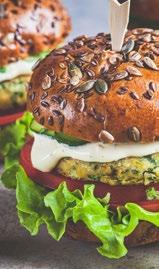
Private labels have the largest share in this sub-segment. „From April 2023 to March 2024, they accounted for 46% of the sales value of this sub-category. The other major player, Danone (Alpro brand), recorded a result of 35%. However, as there is a large price disparity here – Alpro is a much more expensive brand – the true dominance of private labels in the market is shown by the fact that they account for as much as 60% of all plant-based beverage packets sold,” – points out the CMR expert.
The proportions are slightly different if we look at the number of packets sold. In this breakdown, own brands account for 60.8% of the share. Danone accounts for 23%. A few percent, but also significant in the perspective of the entire category, are OSM Piątnica (4.8%), Grana (3.5%), Maspex (2.9%) and Sante (1.7%). The remaining producers account for shares of 3.4%.
Plant-based beverages are the only subcategory among veggie dairy substitutes with a clearly expanding and growing distribution in shops in Poland. According to data collected by CMR, in the period April 2023-March 2024, these products could be found in one in two shops in Poland. A year earlier, the figure was four out of 10 shops. „This is due to the considerable – especially compared to other subcategories of plant-based dairy substitutes – distribution in small-format shops up to 300 sq.m” – Nikodem Pankowiak emphasises.
According to CMR, plant-based dairy substitutes – including plant-based drinks –are by far the best-selling category at discounters. Private label products are the most important for rotation. This is partly due to the rather high prices of substitutes compared to traditional dairy products.
Discounters generated as much as 71% of the sales value of plant-based dairy substitutes in January-March this year. Supermarkets, in turn, accounted for 14%. At the same time, the ‚traditional’ channel, i.e. small-format shops and supermarkets, together accounted for 15% of the category’s sales value.
It is not only dairy products that have found a wide range of alternatives. Indeed, the range of plant-based meat substitutes is growing steadily. It is estimated that over the next five years, the global market for such products could reach USD 140 billion, representing 10% of the global meat industry. Similar trends can be observed in Poland. According to research by Smart Protein, 40% of Poles are already declaring a reduction in meat consumption.
In turn, a study by InsightOut Lab and the Ariadna Panel shows that already two years ago, nearly half of Polish consumers tried products that were plant-based meat substitutes. The main reason was curiosity about taste. 65% of respondents indicated that they were tasty, and 43% started buying them regularly. 62% of participating Poles indicated that they have access to plant-based meat alternatives in the shops they visit.
A report by Strategy& shows that the average Pole ate in 2022, 73.2 kg of meat. This value is 5 kg above the EU average. Despite rising meat consumption, there is also growing interest in meat substitutes. According to PwC estimates, the global market for such products could exceed $234 billion by 2030.
The plant shelf is a growing category that is increasing year on year. It is worth dedicating a separate shelf to it, as, looking at sales results, the segment can make a significant contribution to a shop’s profits. Attention to the comprehensiveness of the offer will certainly meet with the approval of customers. Changing eating habits has a global aspect, which is worth taking advantage of when composing a shop’s offer.


The world is rushing forward and with it consumer expectations. These concern not only products and their quality, but also the packaging in which they are contained. Growing competition in every sales segment means that customers need to be encouraged to choose a particular brand – that is, to meet their demands. And these very often relate to packaging. What should the ideal packaging be in the eyes of the consumer?
Product packaging has to fulfil many functions, especially those intended for food storage. Not only does it have to protect from external influences, but it also has to meet consumers’ expectations, which are becoming ever more demanding. Thus, product packaging should have an interesting design, be functional and transparent, stand out on the shop shelf and... be ecological. And this last factor is the one that an increasing number of consumers are paying particular attention to – as many as 82% of those surveyed say they are willing to pay a premium for sustainable packaging1
The packaging of a product is as important as the product itself. This is confirmed by the EKObarometer survey conducted by SW Research in cooperation with the Akomex Group. Nowadays, consumers are not satisfied with just a high-quality article –the class of what it is packaged in is just as important. For a growing number of Poles, it is essential that packaging is made from recycled raw materials – this is declared by 70% of the countrymen. In addition to this, 65% of Polish consumers believe that those made of cardboard have a less negative impact on the environment than those made of plastic, 63% of the countrymen expect producers to be transparent and to regularly assess the impact of the manufacturing process on the environment, and 62% of Poles surveyed say that their coun -
trymen need more education about the impact of cardboard on the environment 2 .
Cardboard is considered the most biodegradable material by 40% of consumers surveyed. Eco-friendly packaging is not the only issue that consumers point out. Many of them – 68% – note that products are placed in packaging much larger than necessary. This situation wastes the resources used in their production and increases the amount of residue, which has a negative impact on the environment.
Cardboard is considered the most biodegradable material by 40% of consumers surveyed.
„The results of opinion polls clearly confirm the growing environmental awareness among consumers and their positive attitude towards corrugated packaging as a greener alternative to plastics. (...) Also, the phenomenon of over-packaging of products is important from the point of view of brands, and its solution could bring both environmental and economic benefits. It is also important to note that a significant percentage of consumers (70%) expect packaging manufacturers and producers to use recycled raw materials, highlighting the need to reinforce sustainable production practices. Therefore,
the aim of manufacturers must be to provide packaging that is functional, environmentally friendly and tailored to the real expectations of consumers,” – comments Grzegorz Łajca, President of Akomex Group.
Consumers expect packaging manufacturers to provide clear information about the product itself and how the production of packaging affects the environment.
While environmental issues are extremely important to consumers, they are not the only ones – customers expect much more from packaging. Among other things, customers’ purchasing decisions are influenced by the appearance of the packaging. And although it is what is inside that counts, customers buy with their eyes, so the appearance, design, colours or quality of the packaging influences their decisions, encouraging them to put a particular product in their shopping basket. Attractive packaging makes the product stand out on the shelf and arouses customer interest.
Packaging should be aesthetically pleasing with an eye-catching colour that evokes positive emotions. It is also important that the company logo is clearly visible, which helps to build a positive relationship with customers and gain their trust. The shape is also important – an unusual format is easy to spot and arouses consumer interest. However, it is not only the visual impression that determines whether a customer will reach
1 https://www.prnewswire.com/news-releases/wedug-najnowszych-danych-konsumenci-na-caym-wiecie-coraz-czciej-wybieraj-

for a product – the sensory experience is also important. Manufacturers very often make a distinction between women’s and men’s packaging. In the case of those intended for women, the texture is usually softer, while those dedicated to the male gender tend to be harder.
In addition to aesthetics, practicality and convenience are also extremely important. Customers are more likely to choose products with packaging which is easy to open, use and store. As mentioned earlier, Polish consumers attach great importance to clear information on packaging. The origin of the product they contain is crucial to them. Increasingly, Poles are choosing articles from Polish producers, thus wanting to support the local economy.
Honorata Jarocka, Principal Analyst at Mintel, commented on the expectations of nationals regarding packaging: „Within personal health, consumers are looking for a helping hand and facilitation, hence brands should engage more strongly on the graphical issue of packaging with an emphasis on simple and clear communication of product benefits. One piece of the communication puzzle could be visual nutritional labelling systems such as Nutri-Score. Almost a third of Poles (32%) agree with the statement that nutrition labelling systems such as Nutri-Score help them to find healthier products on the shelf. Another important aspect is entertainment and fun. Packaging can fit into the need for around-product engagement, for example by combining an element of fun with sustain-
ability. One example is Nestlé’s ‚Sow seeds, save the bees’ campaign, where the purchase of selected breakfast cereals enabled consumers to receive a sachet of honey plant seeds. Seeds were thus encouraged to be planted in pots, gardens or meadows. Thinking about additional interaction with the brand, it is worthwhile to continue to inspire new culinary experiences with on-the-box recipes on packaging, which remains a practice desired by consumers, especially Polish consumers”3
As the research presented above shows, packaging is of key importance to consumers and it often determines which item lands in the shopping basket. And how do women view product packaging? Is it equally important to them? An ASM Research Solutions Strategy study4 shows that as many as 72.7% of female consumers pay attention to the packaging of a product, and 27.8% of Polish women, if given a choice between two products with similar characteristics, will choose the one with the nicer packaging – even at a higher price. Only 9.5% declare that the packaging does not matter to them.
As it turns out, the largest group of women consider cosmetics’ packaging to be the most important (73.4%). Food packaging (65.35%) and household chemicals (46.6%) are also very important. On the other hand, the packaging of medicines is the least important to women (36.5%). The
cosmetic product most associated with aesthetically pleasing and interesting packaging is perfume, which Polish women were asked about in the survey. On average, 71% of them pay attention to it when buying this type of product (the highest number of indications – 77.3% – in the 18-25 age group), while for only 10.8% of Polish women it is not important (the highest number of indications – 14.8% – in the 36-45 age group). Even 48.3% of respondents are willing to spend more on a perfume if it has interesting packaging.
ASM Research Solutions Strategy’s research also shows that for 43.3% of female consumers, the aesthetics of the packaging matter most, and for more than half its functionality. For 82.7% of Polish women, the packaging of a product encourages purchase and 76.9% of women believe that it influences the perception of an item as expensive or high quality. Appearance is decisive for 75.4% of respondents in the case of a product bought as a gift.
Consumer expectations of packaging are changing, and growing awareness means that more and more consumers are paying attention to the material of manufacture and production to ecological standards. Aesthetics and functionality are also extremely important. One thing is certain – packaging definitely influences purchasing decisions, so meeting consumers’ expectations is crucial for a specific product to end up in their shopping basket.


More than 6 million – that is how many transactions containing sweets take place in Poland every day. That’s around 250,000 per hour. And so throughout the year, their high number translates into a high value of the confectionery market, which, according to CMR, will exceed PLN 20 billion in 2023. What does this segment look like today and in what direction is it developing?
The confectionery market is extensive, encompassing many categories such as cakes, gingerbread, chocolates, wafers, gum, jellybeans, dragees or challah. Such a wide choice contributes to the high number of transactions. It is worth mentioning that, on average, 1 transaction contains 2 different packages of sweets, which, according to CMR calculations, means that approximately 10,000 packages of products from this segment are sold every minute.
The confectionery market is growing due to consumption volumes. According to NielsenIQ, from July 2022 to August 2023, the sales value of a basket of chocolate confectionery increased by 19.7% year-on-year. The institute took into account the categories of cakes, pralines, chocolate bars, impulse wafers, impulse bars, ready-to-eat cakes, chocolate kits and figurines, jimmies, muesli bars and power balls/truffles.
According to Euromonitor International, this increase is mainly due to inflation. Rising raw material and energy costs have caused some companies to raise the prices of the sweets they offer. Despite this, there is still
a demand for the products in question, thus volume sales are growing, albeit more slowly than value sales.
NielsenIQ indicates that from July 2022 to August 2023, volume sales expressed in kilograms increased by 1.3% y-o-y. and reached a value of 404.409 million kg. During the period under review, sales in terms of volume also increased by 5.5 per cent compared to the previous corresponding period and amounted to 3.829 billion units.
Three categories are responsible for more than half of the market. The largest of these are biscuits, which, according to NielsenIQ, accounted for 23.9% of sales of the entire confectionery basket in the period July 2022-August 2023. Pralines came second, accounting for 17.7% of the market share in the period under review, with chocolate bars accounting for 17.3%.
As CMR adds, functional bars, flavoured jellies and chewing gums recorded large increases in sales value in 2023.
What is probably most associated with sweets is chocolate – in the form of bars, chocolate bars, as a topping for wafers or as

a topping for chocolate chips. It is one of the most popular categories of sweets, the consumption of which has remained stable in Poland for years.
According to the report „World and Polish chocolate market 2023”, carried out by E.Wedel, Poles eat an average of 5.8-5.9kg of chocolate per year. The authors of the study forecast that consumption will grow to reach 6.4kg in 2028.
For many consumers, chocolate sweets are a recipe for a good mood – available at affordable prices, they provide a moment of pleasure and have a stress-relieving effect. This is borne out by the findings of Mintel research, according to which 74% of respondents report that this type of sweet improves their mood.
According to Kantar data from April 2021 to March 2022, 74.82% of 15–75-year-olds consume chocolate bars. Of these, 32% do so 2-3 times a month and 26% once a week. The same percentage of respondents reach for chocolate bars once a month or less often. The smallest group are those who consume it more often than once a week – a response given by 15% of respondents declaring to consume chocolate in bars.

The cost of chocolate confectionery has been rising since 2023. According to the ‚Retail Price Index’ report by UCE Research and WSB Merito, in March/April 2024, products containing cocoa became over 10% more expensive year-on-year. This is due to increases in the price of cocoa, which – despite its already high price – continues to rise.
This is mainly due to poor yields in Africa, which is the main global supplier of cocoa fruit seeds. Poor yields are the result of climatic problems (cocoa is not resilient to weather changes) and declining numbers of plantations. UNCTAD predicts a cocoa shortfall of 374,000 tonnes this year, compared to 74,000 tonnes last season.
When the price of cocoa rises, the price of chocolate confectionery automatically increases – and producers react to this. Some defend themselves against high raw material prices by changing the composition of their products or reducing the amount of cocoa in favour of cheaper ingredients. Others opt for shrinkflation, i.e. reducing pack size without changing the price of the goods. Others have passed the costs on to consumers and raised product prices.
Paradoxically, higher prices at the exchange, and thus in the shops, may in the long term influence the cost of cocoa to fall. This is because high prices will encourage farmers to maintain or resume production, in which case higher supply will offset demand.
Paradoxically, higher prices at the exchange, and thus in the shops, may in the long term influence the cost of cocoa to fall. This is because high prices will encourage farmers to maintain or resume production, in which case higher supply will offset demand. This prospect is indeed a long-term one, however, as it will take an average of four to five years to increase production – roughly how long it takes a cocoa tree to bear fruit. Another solution to ending the increases is simply a reduction in demand – this will happen when consumers start to give up on products containing cocoa.
Consumers are most likely to buy sweets from discounters. According to CMR, they accounted for 46% of the sales value in 2023. The second most important channel is small-format shops up to 300 sqm, which account for 32% of the sales value. Superstores
and hypermarkets are next, accounting for 15% and 7%, respectively.
The largest choice among the products in question is found in hypermarkets, with more than 1,000 different products on the shelves. The largest in number in terms of variants are cakes – around 220. In supermarkets, the consumer can choose from around 630 types of confectionery, and in small-format shops from around 220.
Customers choose different sales channels depending on what type of confectionery they want to buy. In the small format, for example, impulse sweets are important. These outlets are widely available, easy to find and quick to make small purchases, fulfilling their small, sweet cravings. „When someone has a craving for something sweet, they usually choose the shop closest to them as their place of purchase: small-format shops up to 300 sq. m are responsible for 42% of the pack -

ages of chocolate bars and 34% of impulse wafers sold”. – CMR experts point out. In supermarkets, on the other hand, biscuits are number 1 in terms of the share of transactions. They account for one in every five packets of sweets sold.
The sales volume of the respective confectionery subcategories is also influenced by the time of year. „September and October account for more than 20 per cent of chocolate bars, impulse wafers, croissants or sesames packets sold. Slightly fewer dragees and coated nuts. September is the best month for chewing gum sales. Although May is equally important in this category. October, on the other hand, is dominated by sales of jellies and marshmallows, as well as funky and refreshing sweets,” explains Przemyslaw Bojanowski of CMR.
As Euromonitor International points out: the time when sales of certain types of sweets increase is also linked to the Christmas calendar. This is confirmed by data from Listonic shopping lists. The company conducted research into the sales of chocolate bars. It shows that, although chocolate is an impulse product, it appears quite often on the lists of the app’s users. It was noted that its purchase is most often planned around Easter and Christmas. In March/April and December, the number of chocolate additions to shopping lists increases on average by 50% compared to the other months.
Health and wellbeing issues are increasingly influencing consumer behaviour who are looking for products that have good ingredients, fewer calories and added vitamins and minerals. The health-conscious trend applies to many FMCG categories – consumers are more likely to put wholemeal bread in their shopping baskets instead of white bread, choose alcohol-free versions of alcohol or limit their meat consumption by choosing plant-based alternatives. These are just a few examples of how the perception of good and conscious eating is changing.
It may seem that reaching for sweets goes against health-promoting trends. However, there are an increasing number of healthier alternatives to the classic confectionery on the market. They have a simple composition, contain no colourings or preservatives, and are natural and organic. Examples of this are nut and date bars, wheat biscuits or jellies based on juices and purees.
When talking about sweets, it is impossible to ignore the issue of sugars, in which there is often a high content. Many people count their calorie intake and try to avoid the excess calories. Several factors contribute to this, the main one being health and weight. The answer to this is the ‚low sugar/ no sugar’ trend, which is gaining popularity across the food industry. This is confirmed by Mintel data, according to which 2 in 5
March/April and December, the number of chocolate additions to shopping lists increases on average by 50% compared to the other months.
European consumers would be happy to consume products with reduced sugar content. This does not only apply to drinks or snacks, but also to sweets, including those with chocolate.
As a result, some manufacturers reduce the sugar content of their products, using natural substitutes such as stevia or other sweet additives such as dates. However, as Maciej Herman, CEO of Lotte Wedel, notes in an interview with SpożywczaTV2, ‚low sugar/no sugar’ is for the time being a limited segment of the Polish market. „I see this trend globally, but in Poland we are strongly conservative as a society. Sugar in sweets is most often replaced by sweeteners such as maltitol, but studies have emerged that indicate that they are not beneficial to health and therefore no better than sugar. On the other hand, natural ingredients like stevia have a very strong impact on taste. We have been testing these types of products, but the Polish consumer rejects them,” – Herman concludes.
Smaller packaging formats may offer an alternative. According to Mintel data, 67% of Polish chocolate confectionery consumers would be more likely to eat a smaller amount of a traditional chocolate variant than a larger product with low sugar content. „Mini portions in the sweets category fit in with the theme of portion control being an important part of a balanced diet and key to weight management. They are

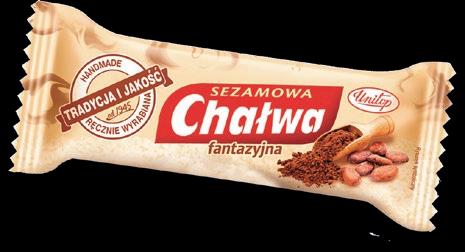



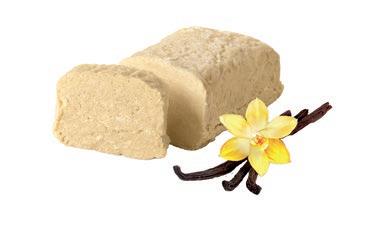
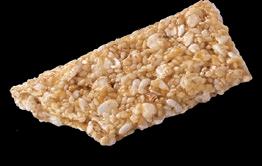



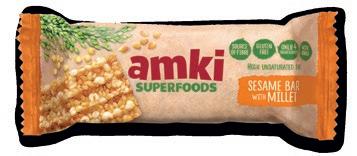
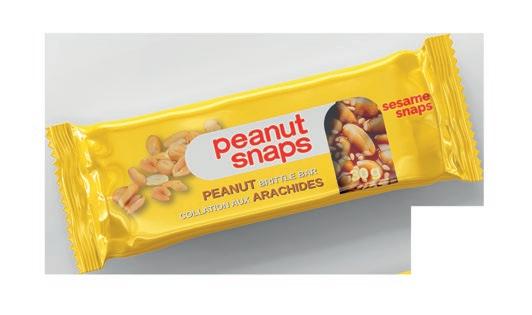




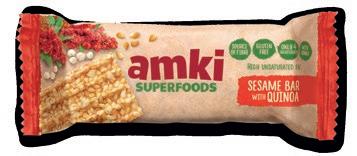

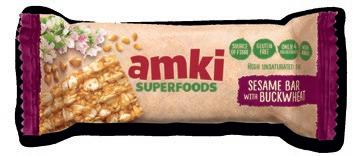

According to Mintel, 37% of consumers prefer manufacturers to reduce the size of their products rather than increase their prices.
also an alternative to better-for-you sweets, thinking about the needs of consumers who are looking for indulgent products that do not cause remorse,” adds Honorata Jarocka, Principal Analyst at Mintel.
In this case, price also matters. According to Mintel, 37% of consumers prefer manufacturers to reduce the size of their products rather than increase their prices. Such decisions are influenced by the fact that the price of sweets is getting higher and higher, and influenced by high inflation, Poles are still trying to watch some of their spending. In addition, some prefer to eat a smaller portion rather than give up their favourite sweet altogether.
Many consumers remain faithful to traditional, all-purpose products – the wellknown chocolate bars or boxes of chocolates that have been bought for various occasions for years. However, a growing group wants to try other options. According to Mintel data, the leading attributes that would drive Polish respondents to buy a new product in the chocolate confectionery category are a new taste (55%), reduced sugar content (39%) and a combination of different textures, such as creamy and crunchy.
This last element, so-called multisensorial, is an increasingly important factor in many confectionery categories. Its basis is the innovative combination of different flavours and textures in a single product, which provide consumers with new experiences. There are confectionery on offer with, for example, salted crisps or shooting sugar.
Functional, cereal and fruit sweets, on the other hand, are a segment that falls into both the innovative and health-promoting prod-

uct categories. Within this category, bars are very popular. Functional ones have the highest sales (41% packets sold in these three categories). A slightly smaller result belongs to cereal bars (39%), and fruit bars are responsible for one in five packs sold.
From April 2023 to March 2024, the most important sales channel for the products in question was discounters, which accounted for 40% of the total sales value of these categories. „However, as these are largely impulse categories, small-format shops up to 300 sq m are still important for their sales, generating 36% of their sales value over the same period,” – adds Nikodem Pankowiak, sales data analyst at CMR.
...cartoons, films, series and games. Manufacturers in the confectionery market have long since discovered that products with illustrations from famous productions have great sales potential. According to CPS GfK data, the total value of FMCG products with licensed graphics from fairy tales, films and series from May 2023 to April 2024 was approximately PLN 482 million. This is an increase of more than 17 p.p. compared to the
previous corresponding period. Consumers’ moods are improving and they are therefore more and more willing to reach for products they consider to be in the premium category. And they include those decorated with pop culture graphics. „The increase in the value of the market for products with licensed graphics is not the only indicator of their growing popularity. In the last year, the number of barcodes for these items has increased by as much as 20%. The main purchasers are families with children, although we can also see growing interest among other demographic groups – especially childless people up to the age of 34,” adds Jakub Dubniak, consultant at Consumer Panel Services GfK.
The confectionery market in Poland is diverse, dynamic and constantly evolving. The prevailing trends are similar to those in other FMCG categories, i.e. pro-health, functionality or innovation. This is why every retailer should stock its shops with both traditional products for lovers of well-known flavours and new ones – with simpler ingredients, added vitamins or interesting textures. In this way, every consumer will find something suitable for him or herself.

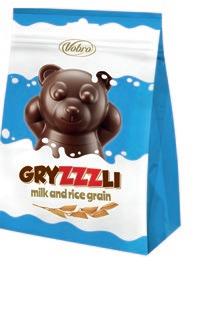

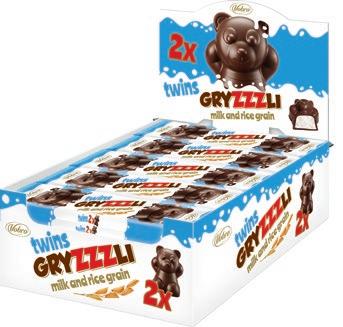


• Quality guarantee and microbiological safety
• Ensuring the welfare of hens based on sustainable development
• Antibiotics free eggs
Diversity of egg o er:

in each category:
• UVTM light disinfection system
• Transport & Logistics services
• Custom packaging on clients demand





We deliver ready-to-use egg powders and liquids which optimize your production chain and its cost:
no storage required for powders in refrigeration space (lower operating costs)
high performance of our products thanks to physicochemical and biochemical properties
less space needed for storage (lower operating costs)

comfortable to use thanks to its functional properties: shelf life of egg powders 24 to 36 months
less waste due to products form (no need to dispose of eggshells)

They add variety to the daily diet, they are a recipe for a little hunger as well as an innocent craving. Snacks are an indispensable part of many people’s diets and their types can be multiplied almost endlessly –chocolates, chocolate bars, waffles, crisps, crackers or popcorn... Most consumers do not include them in their household budget, which is why, despite market turbulence and price rises, this category is doing quite well compared to other FMCG market segments.
A significant proportion of Poles reach for snacks between meals. According to the report ‚National Nutrition Test of Poles 2023’, carried out by Medonet in cooperation with the research agency ARC Rynek i Opinia, 6% of Poles always snack between meals and 35% do so frequently. Half of the respondents try to avoid it and 9% do not reach for snacks at all. The survey also shows that women (48%) snack more often than men (35%). More young people between the ages of 18 and 24 (53%) also opt for a little something than older people over 65 (36%).
And what products do Poles reach for most often? The report shows that confectionary – sweets, cakes, pastries, candy bars, yeast cakes and waffles – are what 44% of respondents reach for. Slightly fewer, 43%, choose fruit and vegetables. The podium is rounded off by nuts, seeds and pips with a score of 28%. Yoghurts, cheese and dairy desserts came next, with 27% of respondents indicating this. Salted products, i.e. crackers,
sticks and crisps, are chosen by 20% of respondents, while vegetable and fruit juices are chosen by 13%.
Polish consumers’ preferences differ depending on their age. Young people (18-24 years old) most often snack on sweet products (63%) and yoghurts, cheeses and dairy desserts (42%), and least often choose vegetable and fruit juices (22%). In contrast, over-65s prefer fruit and vegetables (49%) and sweets (31%), while strongly avoiding salty snacks (4%).
According to NielsenIQ data, from April 2023 to March this year, the snacks market in Poland reached a value of PLN 27.1 billion. Of the sweet ones, Poles spent the most on prepackaged cakes and biscuits (PLN 3.9 billion), pralines (PLN 2.9 billion) and chocolate bars (PLN 2.8 billion). On the other hand, chips and crisps dominated the salty ones – Poles spent PLN 5 billion on them in the period under review.
Consumers most often buy snacks at discount stores. According to NielsenIQ
data, this sales channel is responsible for 42.5% of the volume and 51.8% of the value of sales of snacks in Poland between April 2023 and March 2024. Supermarkets and discounters recorded the most dynamic growth in sales value during the period under review. Only these two channels also recorded volume growth.
In the course of a year, almost 1.4 billion chocolate bars and impulse wafers are sold in Poland. This means that the average Pole eats more than 35 on average per year, assuming a population of 38 million in our country. These are figures from CMR, which looked at how sales of these two categories of sweets are performing on the Polish market.
Between April 2023 and March 2024, the number of packets sold of these snacks fell – by more than 1% for impulse wafers and by around 5% for chocolate bars. The sales channel that lost the most was hypermarkets.

The modern consumer considers sugar-free, lactose-free, gluten-free, organic, pro- and prebiotic-containing products and plant-based options to be such.
According to CMR research, consumers are most likely to buy these types of products in small-format shops, which account for 42% of chocolate bars and 34% of impulse wafers sold. Discounters are also very popular.
The small format offers a wide selection of the sweets in question. From June 2023 to May 2024, the average number of chocolate bar variants in this sales channel was 25. Chocolate wafer proposals were slightly fewer in the period under review, with an average of 18 versions. Shelf width in both cases increased, as did the price per product. The average cost of a bar exceeded PLN 3, an increase of around 13%. Waffles, on the other hand, became slightly less expensive, by around 11%, with consumers paying around PLN 2 per piece.
For 60% of Poles it is important to eat healthily. This is according to the ‚Plate of the Future’ report prepared by the Food for the Future think tank and the Food for the Future Interdisciplinary Centre for Analysis and Cooperation. Food is supposed to support immunity, improve mood or influence good looks. But what does „healthy food” mean? The modern consumer considers sugar-free, lactose-free, gluten-free, organic, pro- and prebiotic-containing products and plantbased options to be such.
Healthy food also means valuable snacks. And more and more people are starting to treat these as meals. This is influenced, among other things, by busy lifestyles – people lack the time to prepare breakfast, lunch
or dinner, so they prefer to reach for a quick snack to satisfy their hunger. According to the ‚5 Huge Snacking Trends 2024’ report by Exploding Topics, up to 70% of Millennials prefer snacks to meals.
Manufacturers predict that the ‚snacks as meals’ trend will continue to grow over the next few years, with consumers increasingly turning to snacks instead of meals – choosing the healthier ones. In the global market, nuts, trail mixes and seeds already have a share of more than 40%. They are followed by protein bars and plant-based snacks. The international trend for nutritious snacks can also be observed in Poland. „Muesli bars recorded the highest growth in sales volume (in kgs), up by as much as 10.4%. Nuts and grains, readymade cakes and impulse wafers also had positive indicators. (...) The dynamic growth in sales of muesli bars and nuts and grains may be a result of the growing awareness of Polish consumers and their desire to change their eating habits to healthier ones,” comments Wojciech Rydzewski of NielsenIQ, analysing data from April 2023-March 2024. Honorata Jarocka, Principal Analyst at Mintel, adds

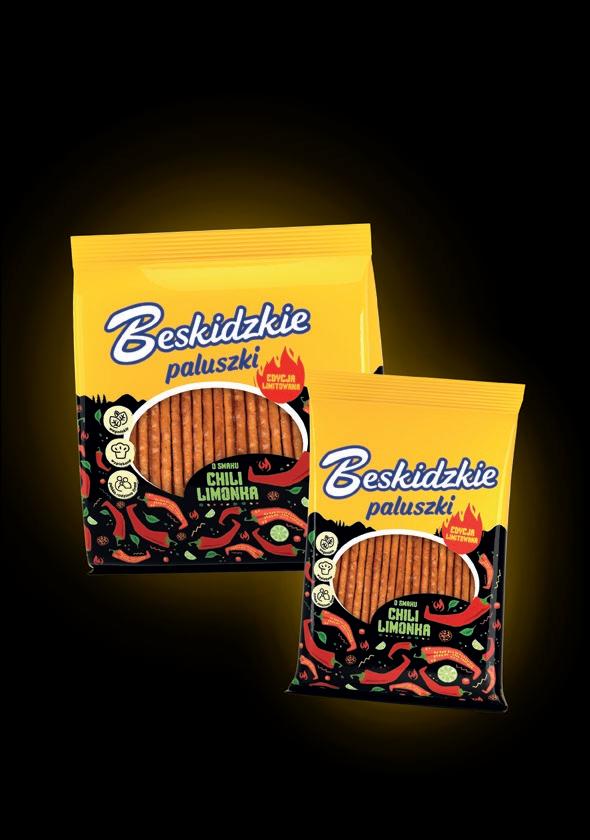



45% of Polish consumers try to reach for snacks that fall within a certain calorie range
that, according to research, 45% of Polish consumers try to reach for snacks that fall within a certain calorie range.
Enhancing wellbeing is also becoming a new task for snacks. Consumers want them to have a positive impact on sleep, concentration and energy levels. This is why they look for beneficial ingredients such as vitamins or adaptogens in their composition. They are also increasingly turning to plant-based products – this for health and environmental reasons. „66% of snack eaters make an effort to choose snacks with specific health benefits (e.g. supporting digestion or cognitive abilities). Plant-based snacking is also an interesting area for innovation, with 64% of respondents in Poland agreeing with the statement that this type of snacking is good for health,” adds the Mintel expert.
And if snacking can replace a meal and have a positive effect on the body, why can’t it satisfy at least some appetite for the world? The authors of ‚5 Huge Snacking Trends 2024’ point out that global consumers, as a result of the pandemic and travel restrictions,
have started to look for exotic flavours from different countries in snacks. In Poland, popular choices include mochi from Japan or Mexican chips.
Brand loyalty is one of the most important factors influencing consumer purchasing decisions. When standing at a shop shelf, customers are more likely to reach for a product from a brand they know and value than for a similar product from another manufacturer. There are product categories that are characterised by particularly high levels of loyalty.
According to Listonic Ads1, customers are generally more loyal to brands that have a strong presence in the market and are easily accessible. This makes them more recognisable, which makes consumers feel more trust and are more likely to buy them. Price is also an important factor – a more favourable price increases the chance of attracting and retaining customers. And if a competitive price goes hand in hand with high quality, a positive consumer experience is built, which is the basis for brand loyalty. Identification with the world view, values and prevailing trends is also an important element.
Listonic Ads took 10 product categories under the microscope and examined consumer attachment to brands in these segments. Medicines took first place, followed by drinks and confectionery. Behind the podium were spirits, ready meals, kitchen accessories, chil-
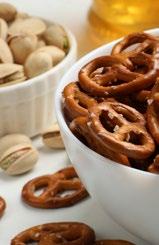
Brand loyalty is one of the most important factors influencing consumer purchasing decisions. When standing at a shop shelf, customers are more likely to reach for a product from a brand they know and value.
dren’s products, breakfast products, salty snacks, and sauces and dips.
When analysing the snack market, two groups are most important: sweets and salty snacks. The former includes candy bars, cakes, chocolates, pralines, sweets, jelly beans, drops, gum, lollipops, as well as cakes and cereal bars. As the authors of the report noted – although sweets are classed as impulse purchases, in which the brand is not necessarily important, in the case of planned purchases it plays an important role. When consumers consciously decide on a particular sweet, they choose the logo of the one they know well. So, when sweet snacks appear on shopping lists, they are specified – specific names are shown to go into the basket. From May 2021 to May 2023, 13.23% of products added to

When analysing the snack market, two groups are most important: sweets and salty snacks.
candy bars, cakes, chocolates, pralines, sweets, jelly beans, drops, gum, lollipops
nuts, pretzels, sticks, crisps, roasts, nachos, crackers
shopping lists were from a well-known brand. In the confectionery category, the most popular were Delicias and Kinder.
When it comes to salty snacks, i.e. nuts, pretzels, sticks, crisps, roasts, nachos and crackers, one in 11 products from this category is added to shopping lists with the indication of a specific brand. As the authors of the study emphasise, price plays a major role in this segment, which is sometimes more important to consumers than loyalty. However, in the case of planned purchases, there is a significant group of people who choose the products of a particular brand despite the higher cost. In this category, customers are attached to Lay’s, Cheetos and Pringles.
We traditionally divide the snack market into sweet and salty, with the snacks themselves intended to satisfy a small hunger or craving. However, when you take a closer look – you see a whole range of flavours, functions and properties. Enthusiasts of the ‚a little something’ are not in short supply – some are devoted to their favourite types of nibbles, while others are attracted to new flavours and innovative ideas.

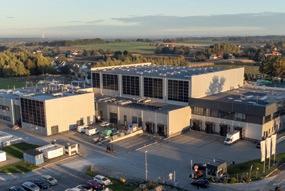










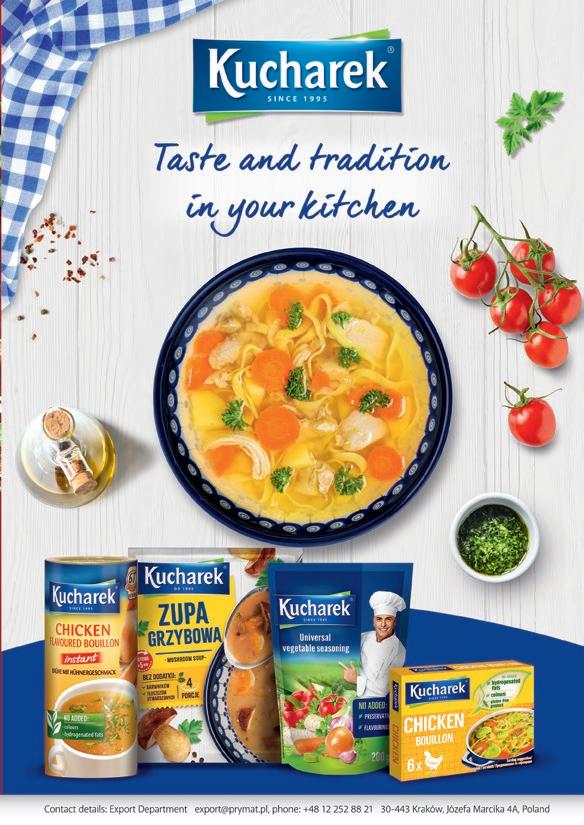
The year 2024 in the FMCG industry was challenging, but also undoubtedly full of interesting market developments. Inflation, changes in consumer preferences and habits or weather anomalies have largely shaped how trade has played out for most of the year. Despite the many difficulties and changes, the last few months seem to have been a successful period, and the prospects for many companies are promising.


Joanna Miziołek
Deputy Editor-in-Chief for Digital Media HURT & DETAL
inability, which has been driving much of the change for several years now. It is not only products that are to be created in an environmentally friendly way, but entire companies should be subordinated to this idea – including their growth strategy or the values that the entrepreneur communicates in their messages.
Maciej Herman
Managing Director
Lotte Wedel
According to NielsenIQ, in the last 12 months1 the value of the basket amounted to PLN 286.5 billion. This in turn represents a year-on-year value growth of 5.8%. As the institute reports, in each of the first three quarters of this year we can also observe positive volume consumption dynamics. And this growth between June and August was 1.1%. However, compared to the second quarter, this is a weakening of the dynamics by 1.5%.

Małgorzata
Cebelińska Vice-President of the Management Board
SM Mlekpol
Wedel’s position on the domestic market is good, we are one of the 3 major players on the Polish chocolate market. The company is currently allocating considerable resources to investment in development. On an ongoing basis, we are automating and modernising internal operational processes and investing in the creation of new production lines. We have recently constructed two new buildings. One of them will house a place unique in Europe – the E.Wedel Chocolate Factory museum, which will invite everyone to a unique world of chocolate, teaching and entertaining. This project will not only become part of the capital’s urban fabric and emphasise the local roots of our company but will also make it possible to invite visitors from all over the world to join us on a chocolate journey. The remaining spaces will enable us to further develop the Wedel range, increasing efficiency and production capacity. An international presence is of strategic importance to us. Step by step we are building our position and brand awareness in selected markets – we are present in more than 60 countries and exports currently account for around 10% of the company’s turnover. We want – and we are doing everything – to make sure that not only the domestic market tastes our chocolate, but that the E.Wedel brand is known in countries all over the world. Wedel’s biggest growth opportunities are the unique and high-quality chocolate products that have been made in our factory for more than 170 years. What is important for our customers – we are a company that is flexible, innovative and open to dynamic cooperation. A mixture of these qualities allows us to achieve our goals and cultivate the traditional values that were introduced to the company by its founders – the Wedel family. The main threat, in my opinion, is the rising prices of raw materials, mainly cocoa. It is worth noting that they have increased several times over the last few months, making cocoa more expensive than copper. Other risks include the dynamic change of other costs (employees, energy). Of long-term importance are the challenges of climate change, political and legislative changes (still not very business-friendly in terms of assumptions and implementation time). Also relevant is the issue of proliferating armed conflicts, which also destabilise many areas of business operations. However, we do our best to turn threats into opportunities and develop the E.Wedel brand in even the most unfavourable conditions.
The CSO regularly reports updated results on the prices of goods and services. In October this year, compared to the same period in 2023, they increased by 5%. Food became more expensive by 0.7%. According to CMR – in the tenth month of the year, the total value of sales in small-format shops up to 300 sq m was 3.9% higher than a year earlier, but the number of transactions fell by as much as 5% compared to October 2023. By contrast, the average number of items per basket in outlets of the aforementioned format was 3.9, 3.5% higher than a year earlier.
The use of artificial intelligence, as well as creative sources of producer-consumer communication, has also gained importance and momentum in the last year. Customers, especially the younger generations, are sensitive to personalisation and the opportunity to interact with their favourite brands. Campaigns, consumer activations or the selection of brand ambassadors have become very important.
The changes that have taken place in the FMCG market are largely the result of the economic concerns of the public, as well as increased awareness. While label reading and greater attention to the number of indices in an ingredient has been a trend for many years, the last 12 months have shown that this has a significant impact on final purchasing decisions.
The TrendKey report, compiled by GfK –An NIQ Company, reveals that our compatriots are increasingly willing to abandon products they have previously purchased if the brand does not meet their expectations. For 90% of those surveyed, the value of a product is perceived in terms of customisation. Not insignificant is also the fact that 3 out of 4 respondents declare buying basic products more thoughtfully due to the economic situation and uncertainty.
Currently, as a milk producer, Poland ranks fourth in Europe, with a positive growth rate of 8% in the first half of 2024. Due to natural conditions, our country still has great potential for the development of milk production, provided that dairy farmers are provided with favourable and stable conditions for their further development and investment. This depends both on the policy of the European Union as a whole and the adaptation of available resources to local conditions, as well as on decisions taken at national level.
The Mlekpol Dairy Cooperative is one of the leaders in the dairy industry in Poland. It owns many popular brands and has an extensive portfolio of high quality dairy products. Its modern production facilities, which include fourteen highly specialised plants, as well as its operations under the cooperative model, ensure the company’s stable position on both domestic and foreign markets.
There are several key trends that will dominate the retail space in 2024. The first is susta-
The NoLo trend – i.e. the fashion for not drinking alcohol or significantly limiting it in the diet – was more pronounced this year than before. The response of producers was immediate – a whole range of 0% spirits appeared, which quickly found recognition in the eyes of consumers and translated into the sales results of this segment. Commissioned by fritz-kola, the SW Research agency conducted a survey „Identification of trends in the consumption of alcoholic and non-alcoholic beverages in Poland”2, which shows that four out of ten people confirm that they have recently reduced their consumption of alcoholic beverages. In contrast, one in ten respondents have stopped drinking alcohol altogether and 16% have not drunk such beverages before.
The next few months may surprise us with new trends, but also an escalation of current ones. This will probably be influenced by similar factors to those at present. The geopolitical situation, the weather and climate change or the economic concerns of consumers will certainly have a major impact.
Currently, 30% of our production is exported, mainly to EU countries, but also to the most distant markets of the Americas, Asia or Africa. Thanks to the high quality of our products and the scale of our production, we are able to meet the expectations of different markets and guarantee foreign partners stable cooperation based on flexibility and understanding of their needs. One of our current priorities is to improve the company’s energy efficiency and reduce its carbon footprint, tasks that are part of our sustainable development strategy. By investing in green energy, Mlekpol aims to ensure maximum energy security and respond to the expectations of modern consumers.
What will 2025 look like? Will past trends continue? What trends will dominate the retail space and what will be the theme for the entire FMCG industry? We asked market representatives for their opinions.
As for risks, we certainly see them in the unstable international situation and legislative risks in Poland and abroad. The ongoing armed conflicts and their recent escalation are not conducive to trade, and not only because of the lengthened supply chains, but also the protectionist customs policies, subsidies and other administrative decisions of numerous countries, which means that many regions will continue to face worsening food crises. At the same time, legislative changes that are too rapid or too far-reaching add to the burdens along the supply chain. Nonetheless, as a responsible company, we strive to be flexible in our approach to our business and adapt our production and product range to the needs of our partners in different corners of the world on an ongoing basis.


Carlsberg Poland
Beata Fabia-Hołda Co-founder and co-owner


Karol Pilaciński Export Director Bogutti

Aleksandra Kusz vel Sobczuk Head of Communications

The year 2024 brought many challenges to the beer industry. A huge amount of work was involved in preparing the implementation of the bail system. For several months we were operating on vague, even unpredictable legislative ground. The lack of clear regulations made it difficult to organise the system and prepare the market for the changes.
It is with great pleasure that I share what is currently happening in our company and our plans for the future. I am extremely proud of our achievements, as Adalbert’s Tea has become one of the most popular premium tea brands in Poland, which brings us immense satisfaction. Moreover, we see great potential in expanding internationally, especially in Europe, where our products are gaining increasing interest.
What sets Adalbert’s Tea apart is, above all, the passion with which we create our products. Our tea comes from plantations in Sri Lanka, a country renowned for producing the highest quality teas. We create our products with love and passion, inspired by the beauty and richness of Ceylon’s nature. Every step of production—from handpicking to traditional processing methods—is carried out with respect for the centuries-old traditions of Sri Lanka and its greatest treasure, tea. This allows us to ensure a unique taste and aroma that captures the spirit of this extraordinary island. Our elegant packaging further emphasizes the exclusive character of our products, making them exceptional in both taste and aesthetics.
After a dramatic 2023, the decline in beer sales has slowed, but the industry is struggling with the negative narrative around the beer category. It erroneously equates our low – and non-alcoholic category with the spirits segment. It ignores the fact that the consumption culture of the two categories is very different. Consumers choose beer for taste, not for alcohol content. This is why the strong beer segment has been declining for years and the only one growing is that of non-alcoholic beers, with a very dynamic growth of 17% (in the first 3 quarters). The category remains the leader of the NoLo – no alcohol, low alcohol – trend. We also see a regular decline in the share of alcohol in beer.
In addition, the rolling increase in excise duty means that today the average price of beer in Poland is higher than in Germany, the Czech Republic or Slovakia. This has resulted in declines in retail sales (-3% on an annual basis).
In the near future, we have many ambitious plans. We are working on new, unique flavours and planning to introduce innovative editions of our teas, which will surely interest our loyal customers and attract new ones. We are also focusing on developing partnerships with international distributors to bring our products to additional markets. Of course, international expansion comes with certain challenges. Each market is different and requires a tailored approach. In Europe, the competition is strong, which is why we emphasize the highest quality of our products, their unique flavour, and exclusive character.
It was neither a very good nor a very bad year – we maintained the so-called cumulative annual growth rate (CARG) at a double-digit level, which is proof that we are growing slightly faster than the wine market in Poland.
Our goal in the coming period is to continue growing both domestically and internationally. We are also deeply committed to consumer education – we want people to not only savour the taste of our teas but also understand their tradition. We aim for a cup of Adalbert’s Tea to become a daily ritual, celebrated with joy and pleasure.
It is worth emphasising that all the time our country has a gigantic potential for development. Poles’ awareness and knowledge of wine is growing. Standing at the shop shelf, they have increasingly high expectations. This market behaviour is called the premiumisation of brands, hence the increase in sales value rather than quantity in the statistics. This pleases us immensely, for Partner Center’s mission is for Poles to drink quality wines. This is what we strive to offer.
We have also seen some trends in the last year. Firstly, the huge popularity of organic and natural wines and those produced with so-called minimal intervention.
Secondly, sparkling wines. This is a category that has seen steady growth. This is especially true for Italian prosecco and Spanish cava. Interestingly, sparkling wines have even begun to be produced with great success in regions hitherto unknown for such production!
And, of course, the growing popularity of wines with reduced alcohol or no alcohol at all. This is definitely a new chapter for the whole industry.
Bogutti Company successfully exports its products to more than 50 countries on all continents, achieving a global reach. In my opinion, the current situation of the company is very positive. We are regularly attracting new customers and developing our offer with new product lines. Our diverse customer base enables us to manage our product range effectively and deal with local crises more efficiently. The key for us is that we are not dependent on one strategic customer, which gives us greater flexibility and stability. We see great opportunities for growth through ongoing investments, such as the purchase of new production lines. This will allow us to significantly expand our range and increase our production capacity, which will enable us to both attract new partners and increase sales with existing customers. We are particularly interested in developing the sugar-free segment, which is enjoying growing interest. However, volatile raw material prices are a significant threat. In recent years, we have noticed drastic increases in the prices of sugar, milk, butter and chocolate, which significantly hinders sales planning and an effective pricing policy. Price spikes pose a particular challenge, especially when signing annual product supply contracts.
The past year has certainly been a historic one for us, if only due to the realisation of Wedel’s largest investment in 100 years, the E.Wedel Chocolate Factory museum. In addition to new production spaces, we have made available to visitors a place where they can literally touch the history of the chocolate world, combining it with modernity.
Beskidzkie is one of the leading brands in the snacks category in Poland. Thanks to its recognition, wide range of products and high quality, the brand maintains a strong position in the market. Our Pretzel Sticks, Pretzels, Bagels, Snack Mixes or Crackers, are available in most retail chains and are very popular among consumers. This is due to both, traditional nature of the brand, together with company’s 100% Polish origin, and our ability to introduce innovations, at the same time. As despite the strong position, we still see areas for development, like interesting flavours, new consumer deals or the ever-growing trend for simple, natural ingredients.
2024 was full of a whole range of often non-standard, surprising collaborations and product innovations. Wedel plus Magnesium chocolates and bars, chocolate-covered nuts prepared in cooperation with Bakalland or even items of clothing resulting from cooperation with Gatta appeared on the market. Despite facing rising raw material prices, we have had plenty of reasons to celebrate and rejoice. We wish that the coming year, in which we will focus on further developing our offer, surprising customers with unconventional proposals and reaching out to consumers looking for diverse product categories, will be equally fruitful for us.

Łukasz Knapowski
Commercial Director Aksam
Paweł Majchrzak Chief Operating Officer, Member of the Management Board Gibar
Apart from being main player in domestic market, we are reliable supplier to the international markets. Currently, Aksam supplies its snacks to 30 countries around the world – on almost every continent. Although we mainly produce under Beskidzkie brand, we also have an international brand, Soleo, available in places like South Africa, Ireland or Italy. We have established long-term partnerships abroad, thanks to the high quality of the products (raw materials, certificates including IFS, BRC, Sedex), the excellent level of service as well as the open-mindedness and flexibility. But that does not stop us from constantly growing, by looking for new markets and expanding our product offer. We see many opportunities in the increasing global demand for snacks, which are an attractive choice in terms of the wide range but also affordable price. Besides, consumers are paying more and more attention to what they eat. And in this matter, Aksam cares about the quality of the raw materials and their sources. For instance, we use only rapeseed oil and have dispensed with glucose-fructose syrup. However, just like other industries the trade of savoury snacks, with its’ specifity, have risks for the development. Among them, are unstable situation in the raw materials and energy markets. Climate change and political instability may further adversely affect the availability of raw materials, production and distribution costs and demand in certain markets. In addition, customers are increasingly focusing on whether a company is developing within the concept of sustainability, and this requires manufacturers to adapt their operations and offer to meet these expectations. Therefore, it seems crucial to strike a balance between ESG and maintaining the financial health of companies. In conclusion, we are striving to spread the joy of crunching around the world, and the satisfaction of customers is the best reward for our hard work.
The past year for the confectionery industry was full of challenges and dynamic changes. The continued rise in raw material prices, particularly for chocolate, has been strongly felt. We have noticed that consumers are choosing products more and more consciously, expecting the highest quality and transparency in ingredients. This motivates us to further improve our offer and adapt our activities to meet the changing needs of the market. Despite the difficulties, we were able to achieve a number of important goals. We have significantly developed our sales department, which has resulted in the acquisition of several key customers. One of our landmark successes was the opening of a new distribution channel in the form of vending. The past months have been noticeably dominated by trends related to the convenience of products. Consumers are increasingly turning to smaller, handier packaging that fits perfectly with their daily needs.
Next year is a time of new challenges for our company, Gibar. We plan to enter into further collaborations, continually expand our portfolio with innovative products and optimise our warehouse policy. We look to the future with optimism and believe that the coming year will bring further successes.



Jan Kolański President of the Management Board Colian


Maciej Herman Managing Director Lotte Wedel

Rafał Adamski Sales Director
I.D.C. Polonia


Małgorzata Cebelińska Vice-President of the Management Board SM Mlekpol
Joanna Ściebura Brand Manager
Podravka Polska
The past year was a period of intensive work for Colian which, due to the numerous challenges, required full commitment and caution. In the face of the uncertain geopolitical situation and various complications related, among other things, to the increase in cocoa bean prices, we implemented planned projects with great prudence and focus. Despite the challenges, we did not deviate from our chosen course, consistently building Colian’s strength also in export markets. The foreign offer under the Goplana brand is finding an increasingly wide audience. At the same time, we are developing the Elizabeth Shaw and Lily O’Brien’s brands, which belong to the premium segment and are enjoying significant sales success in their category. We also plan to expand our existing infrastructure in the Islands to support their further development. In Poland, we are preparing for key investments in the coming years. In Opatówek, where Hellena-branded beverages are produced, a confectionery plant will be built together with a modern development and research centre. Design work is underway.
The year 2024 brought many challenges to the alcohol industry in Poland, but also opportunities for development. Despite the difficulties, we achieved several key objectives: strengthening our position in the premium and mainstream segments, developing innovative products and increasing the availability of an offer that responds to trends related to lower alcohol content. New variants of brands such as Soplica and Żubrówka were successful, allowing us to reach a wider audience and meet the needs of increasingly conscious consumers. In addition, we expanded the portfolio with the Bitter category by introducing 100% natural Soplica Gorzka.
The year was dominated by three main trends: the growing importance of the no-alco and low-alco categories, the increasing interest in premium products and the emphasis on sustainability. In 2025, we plan to continue to grow in key areas, with particular focus on innovative expansion like Żubrówka ŻU or Soplice Exotyczne and further strengthen our position in the premium segment. We will place even more emphasis on the development of the low-alco category, which still has huge growth potential. We will also intensify educational activities and cooperation with trade partners to jointly raise awareness of new trends and adapt sales to changing consumer expectations.
The year 2024 on the confectionery market in Poland brought stability, despite economic challenges. The average Pole ate 5.8 kg of sweets in 2024, which puts us in the middle of the European pack and bodes well for the coming year.
Mintel data shows that one in three Poles pays attention to products rich in vitamins and minerals. Consumers reach for sweets with simple ingredients, such as Andante sponge cakes, and functional products, such as Verbena sweets with vitamins.
Wedel’s position on the domestic market is good, we are one of the 3 major players on the Polish chocolate market. The company is currently allocating considerable resources to investment in development. On an ongoing basis, we are automating and modernising internal operational processes and investing in the creation of new production lines. We have recently constructed two new buildings. One of them will house a place unique in Europe – the E.Wedel Chocolate Factory museum, which will invite everyone to a unique world of chocolate, teaching and entertaining. This project will not only become part of the capital’s urban fabric and emphasise the local roots of our company but will also make it possible to invite visitors from all over the world to join us on a chocolate journey. The remaining spaces will enable us to further develop the Wedel range, increasing efficiency and production capacity. An international presence is of strategic importance to us. Step by step we are building our position and brand awareness in selected markets – we are present in more than 60 countries and exports currently account for around 10% of the company’s turnover. We want – and we are doing everything – to make sure that not only the domestic market tastes our chocolate, but that the E.Wedel brand is known in countries all over the world. Wedel’s biggest growth opportunities are the unique and high-quality chocolate products that have been made in our factory for more than 170 years. What is important for our customers – we are a company that is flexible, innovative and open to dynamic cooperation. A mixture of these qualities allows us to achieve our goals and cultivate the traditional values that were introduced to the company by its founders – the Wedel family. The main threat, in my opinion, is the rising prices of raw materials, mainly cocoa. It is worth noting that they have increased several times over the last few months, making cocoa more expensive than copper. Other risks include the dynamic change of other costs (employees, energy). Of long-term importance are the challenges of climate change, political and legislative changes (still not very business-friendly in terms of assumptions and implementation time). Also relevant is the issue of proliferating armed conflicts, which also destabilise many areas of business operations. However, we do our best to turn threats into opportunities and develop the E.Wedel brand in even the most unfavourable conditions.
2024 is a time for innovation in the confectionery market. Companies are combining classic flavours with modern trends. The GIGA Highlander product (the longest wafer on the market) in chocolate proved to be an interesting product. Seasonal products, such as limited editions to celebrate the holidays, which build an emotional bond with the brand and attract consumers at key times, are also gaining popularity.
Currently, as a milk producer, Poland ranks fourth in Europe, with a positive growth rate of 8% in the first half of 2024. Due to natural conditions, our country still has great potential for the development of milk production, provided that dairy farmers are provided with favourable and stable conditions for their further development and investment. This depends both on the policy of the European Union as a whole and the adaptation of available resources to local conditions, as well as on decisions taken at national level.
Despite positive trends, the market is facing challenges – such as inflation and rising raw material prices. Manufacturers have taken decisions to increase prices, reduce pack sizes and modify compositions. The year 2024 in the confectionery market in Poland is a time of transition. Despite the economic challenges, however, the market maintains its momentum.
The Mlekpol Dairy Cooperative is one of the leaders in the dairy industry in Poland. It owns many popular brands and has an extensive portfolio of high quality dairy products. Its modern production facilities, which include fourteen highly specialised plants, as well as its operations under the cooperative model, ensure the company’s stable position on both domestic and foreign markets. Currently, 30% of our production is exported, mainly to EU countries, but also to the most distant markets of the Americas, Asia or Africa. Thanks to the high quality of our products and the scale of our production, we are able to meet the expectations of different markets and guarantee foreign partners stable cooperation based on flexibility and understanding of their needs. One of our current priorities is to improve the company’s energy efficiency and reduce its carbon footprint, tasks that are part of our sustainable development strategy. By investing in green energy, Mlekpol aims to ensure maximum energy security and respond to the expectations of modern consumers.
The VEGETA brand has been helping you cook for 65 years, ensuring that every dish tastes great. Our spices are an everyday support for those who want to prepare dishes full of aroma. However, VEGETA is not only about convenience – it also inspires culinary creativity and experimentation. Therefore, a novelty has appeared in the brand’s portfolio – the VEGETA Umami liquid seasoning. This is an innovative product that will give dishes an intense taste and aroma in a matter of moments. In 2024, we also enriched the offer of PODRAVKA Pasta „2 minutes” with a new shape – penne. This year, in collaboration with Michelin Guide-awarded chef Luke Theus, we have created four e-books full of inspiring recipes for every cooking enthusiast. Through social and traditional media, we share interesting facts and culinary ideas with our audience.
We were also a partner of Radio Zet’s holiday activation „And maybe to the sea...”. During six holiday weekends, holidaymakers could visit the VEGETA zone, where plenty of attractions and tasty snacks were waiting for them. We are currently running a consumer lottery „Twist your taste with VEGETA”, in which every participant wins a prize and which will continue until 28 February.
As for risks, we certainly see them in the unstable international situation and legislative risks in Poland and abroad. The ongoing armed conflicts and their recent escalation are not conducive to trade, and not only because of the lengthened supply chains, but also the protectionist customs policies, subsidies and other administrative decisions of numerous countries, which means that many regions will continue to face worsening food crises. At the same time, legislative changes that are too rapid or too far-reaching add to the burdens along the supply chain. Nonetheless, as a responsible company, we strive to be flexible in our approach to our business and adapt our production and product range to the needs of our partners in different corners of the world on an ongoing basis.
We are not slowing down in the new year – we are planning further product innovations and activities that will inspire Poles to express themselves through cuisine.



The year 2024 was a time of dynamic change and development for Sonko. Already at the beginning of the year, we implemented a new sales and marketing department structure, which allowed us to better respond to market and consumer needs. Another important development was the change of ownership – since November Sonko has been part of the Euricom group – which opens up new growth opportunities for us, including in European markets.
It is with great pleasure that I share what is currently happening in our company and our plans for the future. I am extremely proud of our achievements, as Adalbert’s Tea has become one of the most popular premium tea brands in Poland, which brings us immense satisfaction. Moreover, we see great potential in expanding internationally, especially in Europe, where our products are gaining increasing interest.
We realised two advertising campaigns that effectively supported the light snacks category, which is growing dynamically in Poland and Europe. It was a year of building brand awareness as a leader in this segment and introducing consumers to the world of healthy and light products.
In 2025, we intend to invest even more heavily in marketing and product innovation. We plan further innovations in the healthy snacks category, as well as intensive export development. Sonko remains a brand that combines lightness, health and pleasure, responding to the changing needs of today’s consumers.
What sets Adalbert’s Tea apart is, above all, the passion with which we create our products. Our tea comes from plantations in Sri Lanka, a country renowned for producing the highest quality teas. We create our products with love and passion, inspired by the beauty and richness of Ceylon’s nature. Every step of production—from handpicking to traditional processing methods—is carried out with respect for the centuries-old traditions of Sri Lanka and its greatest treasure, tea. This allows us to ensure a unique taste and aroma that captures the spirit of this extraordinary island. Our elegant packaging further emphasizes the exclusive character of our products, making them exceptional in both taste and aesthetics.
In the near future, we have many ambitious plans. We are working on new, unique flavours and planning to introduce innovative editions of our teas, which will surely interest our loyal customers and attract new ones. We are also focusing on developing partnerships with international distributors to bring our products to additional markets. Of course, international expansion comes with certain challenges. Each market is different and requires a tailored approach. In Europe, the competition is strong, which is why we emphasize the highest quality of our products, their unique flavour, and exclusive character.
Our goal in the coming period is to continue growing both domestically and internationally. We are also deeply committed to consumer education – we want people to not only savour the taste of our teas but also understand their tradition. We aim for a cup of Adalbert’s Tea to become a daily ritual, celebrated with joy and pleasure.
As the processing division of Poland’s largest white meat producer, our first priority is to build added value for the consumer in chicken products. We dedicated 2024 to this goal and will consistently pursue it in the years to come as well. We have introduced, on shop shelves, Poland’s first cold cuts, snacks and ready meals in the high protein trend. With the latter, we intend to change consumer attitudes towards the fast food category by offering quick, but in our case – healthy solutions tailored to the needs of conscious consumers.

Vice-President of the Management Board for Strategy and Development
In 2024, we also launched an absolute novelty – Duda Premium ambient chicken paste. Enclosed in a convenient tube, this high-protein product in three flavours – chilli, classic and with boletus – perfectly responds to European trends in the category of non-refrigerator snacks. The positive results of consumer surveys and current sales figures confirm its potential, which in turn strongly encourages us to further develop the paste line.
Karol Pilaciński Export Director Bogutti

Janusz Ciepliński Member of the Supervisory Board MAGO


Tomasz Potrzebowski
International Wine Market Development Expert
Henkell Freixenet Polska
We are also working on the implementation of further projects where we will combine innovation, product functionality and cobranding. We are convinced that we will surprise our customers again, while strengthening the position of the Duda brand on the market. We have another exciting year ahead of us!
Bogutti Company successfully exports its products to more than 50 countries on all continents, achieving a global reach. In my opinion, the current situation of the company is very positive. We are regularly attracting new customers and developing our offer with new product lines. Our diverse customer base enables us to manage our product range effectively and deal with local crises more efficiently. The key for us is that we are not dependent on one strategic customer, which gives us greater flexibility and stability. We see great opportunities for growth through ongoing investments, such as the purchase of new production lines. This will allow us to significantly expand our range and increase our production capacity, which will enable us to both attract new partners and increase sales with existing customers. We are particularly interested in developing the sugar-free segment, which is enjoying growing interest. However, volatile raw material prices are a significant threat. In recent years, we have noticed drastic increases in the prices of sugar, milk, butter and chocolate, which significantly hinders sales planning and an effective pricing policy. Price spikes pose a particular challenge, especially when signing annual product supply contracts.
We are living in extremely dynamic times, which present the retail industry with numerous challenges. The pandemic, the war in Ukraine or the current economic instability have significantly affected consumer expectations. A key trend that will dominate 2025 will be the growing demand for a personalised offer – especially among generation Z, who expect a personalised approach and for the offer to be in line with their values. The answer to these needs is phygital solutions, such as our CLEVER mobile self-service checkouts, which bridge the online and offline worlds, streamlining the shopping experience and building customer loyalty.
The second clear trend is automation, which includes both payment processes and shop organisation. An example of this is our NEXTO line of solutions, which enable the creation of autonomous 24/7 points of sale, supported by artificial intelligence. AI makes it possible not only to reduce operating costs, but also to better tailor the offer to customers’ needs.
At MAGO, we look at challenges as an opportunity. Therefore, the development of technologies, such as automation and AI, will be our priority, enabling us to adapt to the new reality and continue to grow, both in Poland and in foreign markets.
The year 2024, once again, was undoubtedly the reign of sparkling wines. This segment has been growing rapidly for several years, contributing to the growth of the entire wine category. Of course, prosecco continues to lead the ‚sparkling’ market. The favourite sparkling wine of Poles was the catalyst for growth for the entire sparkling wine segment and was its most important part. When analysing the sparkling wine market, one cannot forget Spanish cava, which has won the approval of a wide range of consumers in the past year. The year 2024 also saw great success for the NoLo segment – in particular the non-alcoholic equivalents of sparkling wines. This trend is developing rapidly and the forecasts for the new year are equally optimistic.
Beskidzkie is one of the leading brands in the snacks category in Poland. Thanks to its recognition, wide range of products and high quality, the brand maintains a strong position in the market. Our Pretzel Sticks, Pretzels, Bagels, Snack Mixes or Crackers, are available in most retail chains and are very popular among consumers. This is due to both, traditional nature of the brand, together with company’s 100% Polish origin, and our ability to introduce innovations, at the same time. As despite the strong position, we still see areas for development, like interesting flavours, new consumer deals or the ever-growing trend for simple, natural ingredients. Apart from being main player in domestic market, we are reliable supplier to the international markets. Currently, Aksam supplies its snacks to 30 countries around the world – on almost every continent. Although we mainly produce under Beskidzkie brand, we also have an international brand, Soleo, available in places like South Africa, Ireland or Italy. We have established long-term partnerships abroad, thanks to the high quality of the products (raw materials, certificates including IFS, BRC, Sedex), the excellent level of service as well as the open-mindedness and flexibility. But that does not stop us from constantly growing, by looking for new markets and expanding our product offer. We see many opportunities in the increasing global demand for snacks, which are an attractive choice in terms of the wide range but also affordable price. Besides, consumers are paying more and more attention to what they eat. And in this matter, Aksam cares about the quality of the raw materials and their sources. For instance, we use only rapeseed oil and have dispensed with glucose-fructose syrup. However, just like other industries the trade of savoury snacks, with its’ specifity, have risks for the development. Among them, are unstable situation in the raw materials and energy markets. Climate change and political instability may further adversely affect the availability of raw materials, production and distribution costs and demand in certain markets. In addition, customers are increasingly focusing on whether a company is developing within the concept of sustainability, and this requires manufacturers to adapt their operations and offer to meet these expectations. Therefore, it seems crucial to strike a balance between ESG and maintaining the financial health of companies. In conclusion, we are striving to spread the joy of crunching around the world, and the satisfaction of customers is the best reward for our hard work.
For Henkell Freixenet Polska, it was an excellent period in which our key wine brands grew rapidly. Mionetto signature products broke sales records and Mionetto Prosecco established itself as the category leader, confirming it as the Poles’ favourite prosecco. We are equally pleased with the development of the Freixenet brand. The wide range of products in many segments of the wine market and their high quality mean that these wines are systematically chosen by an increasing number of consumers.
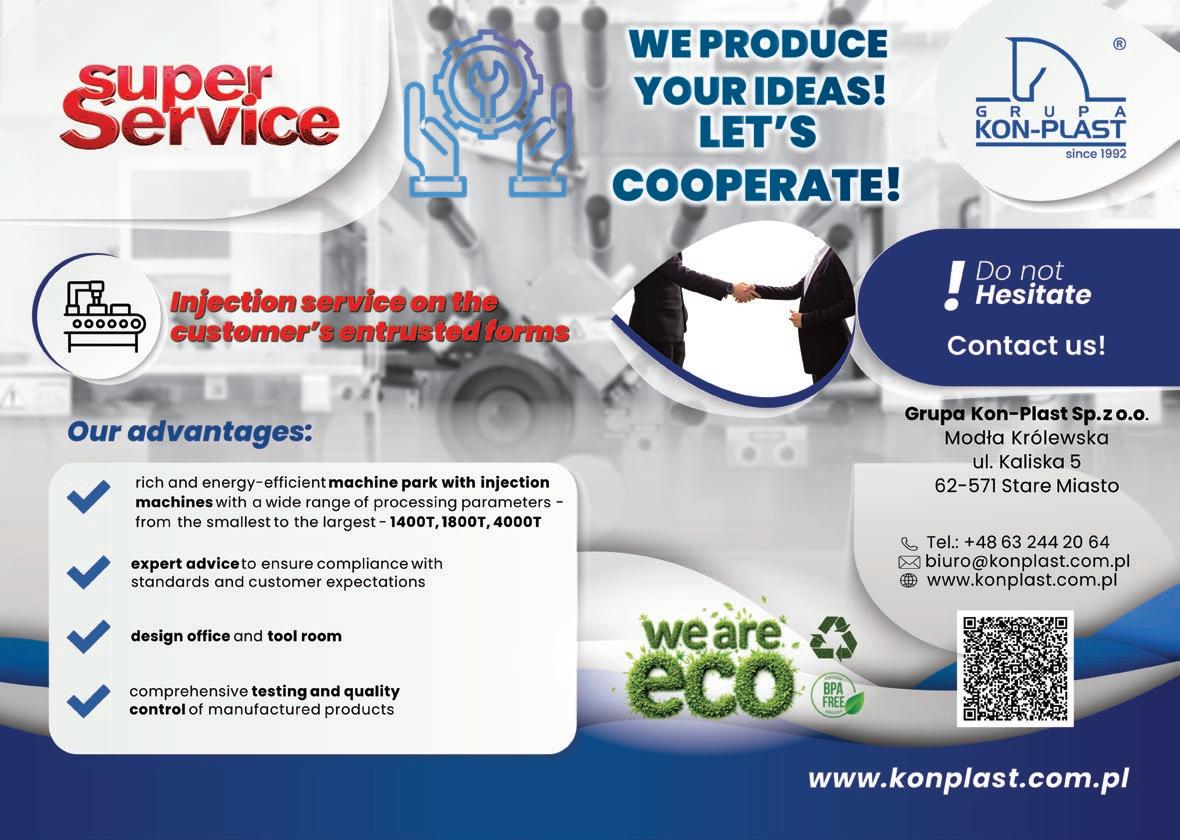


Marcin Snopkowski Director General Grycan – Ice cream for generations

The year 2024 was a good one for the entire ice cream industry. The very warm spring favoured the ice cream category, which grew significantly compared to past seasons – both in terms of value and consumption. New players appeared on the market – confectionery brands that are expanding their portfolio to include ice cream. This has certainly affected the whole picture of the ‚ice cream shelf’. The Grycan brand has again strengthened its position as the market leader in family ice cream. We have increased the availability of our products – we are present in all key retail chains and have also reached new shops in the traditional market. New products, in particular Cream Ice Cream with caramel sauce, were a great sales success. Thanks to an extensive marketing campaign, the Grycan brand was the most heavily advertised family ice cream brand in the past year. These activities resulted in very good sales results and an increase in brand shares.
In terms of challenges, in 2024 there was a huge increase in the price of key base raw materials: cream, cocoa, chocolate, nuts and the cost of production. These increases entail price adjustments.
In the past year, WSP „Społem” recorded significant commercial and economic successes, strengthening its position on the market. The growing popularity of Kielecki mayonnaise and the maintenance of stable product prices, despite the increase in the cost of raw materials, confirm the effectiveness of the strategy adopted by the company.

President of the Management Board

Maciej Herman Managing Director Lotte Wedel
PR Manager and Strategic Marketing TiM


Marek Osuchowski Director of Trade and Marketing Wielkopolski Indyk
Małgorzata Cebelińska Vice-President of the Management Board SM Mlekpol
In 2025, the company will begin construction of a modern hall dedicated exclusively to the production of Kielecki Mayonnaise. The facility will include a manufacturing section, technical and social facilities, and the implementation of advanced technologies, such as automation and robotisation, will allow the company to increase efficiency and the possibility of producing new flavour and volume variants of the product. The investment worth PLN 62 million is a key stage in the development of WSP „Społem” and will strengthen the company’s position both in Poland and abroad.
In 2024, the wine industry was facing various challenges, and there were also several key trends that were shaping its development. Among consumers, a greater interest in ecological practices in wine production could be observed than before. This trend forced winemakers to take proactive measures to protect the environment, which often involved the introduction of new and costly solutions. 2024 also saw major changes in customer preferences. There was a systematic increase in interest in non-alcoholic and low-alcohol wines. Distributors and producers also saw strong demand for sparkling and white wines with a clear shift towards dry and semi-dry wines.
Wedel’s position on the domestic market is good, we are one of the 3 major players on the Polish chocolate market. The company is currently allocating considerable resources to investment in development. On an ongoing basis, we are automating and modernising internal operational processes and investing in the creation of new production lines. We have recently constructed two new buildings. One of them will house a place unique in Europe – the E.Wedel Chocolate Factory museum, which will invite everyone to a unique world of chocolate, teaching and entertaining. This project will not only become part of the capital’s urban fabric and emphasise the local roots of our company but will also make it possible to invite visitors from all over the world to join us on a chocolate journey. The remaining spaces will enable us to further develop the Wedel range, increasing efficiency and production capacity. An international presence is of strategic importance to us. Step by step we are building our position and brand awareness in selected markets – we are present in more than 60 countries and exports currently account for around 10% of the company’s turnover. We want – and we are doing everything – to make sure that not only the domestic market tastes our chocolate, but that the E.Wedel brand is known in countries all over the world. Wedel’s biggest growth opportunities are the unique and high-quality chocolate products that have been made in our factory for more than 170 years. What is important for our customers – we are a company that is flexible, innovative and open to dynamic cooperation. A mixture of these qualities allows us to achieve our goals and cultivate the traditional values that were introduced to the company by its founders – the Wedel family. The main threat, in my opinion, is the rising prices of raw materials, mainly cocoa. It is worth noting that they have increased several times over the last few months, making cocoa more expensive than copper. Other risks include the dynamic change of other costs (employees, energy). Of long-term importance are the challenges of climate change, political and legislative changes (still not very business-friendly in terms of assumptions and implementation time). Also relevant is the issue of proliferating armed conflicts, which also destabilise many areas of business operations. However, we do our best to turn threats into opportunities and develop the E.Wedel brand in even the most unfavourable conditions.
At TiM, we have emphasised education since the beginning, and this has not changed over the years; on the contrary, every year we gain momentum in our activities to emphasise the importance of awareness. We organise numerous training courses, tastings and workshops for our business partners. We also pay attention to the growing importance of digital tools. This has resulted in the development of the e-tim sales platform dedicated to customers in the retail market with a licence to sell alcohol. In 2025, we want to grow dynamically, expand our existing partnerships and enter into new ones, build awareness, educate and guide consumers along the trail of quality wines because everything we do, we do for the love of wine.
Currently, as a milk producer, Poland ranks fourth in Europe, with a positive growth rate of 8% in the first half of 2024. Due to natural conditions, our country still has great potential for the development of milk production, provided that dairy farmers are provided with favourable and stable conditions for their further development and investment. This depends both on the policy of the European Union as a whole and the adaptation of available resources to local conditions, as well as on decisions taken at national level.
The Mlekpol Dairy Cooperative is one of the leaders in the dairy industry in Poland. It owns many popular brands and has an extensive portfolio of high quality dairy products. Its modern production facilities, which include fourteen highly specialised plants, as well as its operations under the cooperative model, ensure the company’s stable position on both domestic and foreign markets. Currently, 30% of our production is exported, mainly to EU countries, but also to the most distant markets of the Americas, Asia or Africa. Thanks to the high quality of our products and the scale of our production, we are able to meet the expectations of different markets and guarantee foreign partners stable cooperation based on flexibility and understanding of their needs. One of our current priorities is to improve the company’s energy efficiency and reduce its carbon footprint, tasks that are part of our sustainable development strategy. By investing in green energy, Mlekpol aims to ensure maximum energy security and respond to the expectations of modern consumers.
The year 2024 was a time of challenges, but also successes. Like the whole industry, we have faced challenges such as rising production costs – higher wage costs, higher feed, energy and transport prices, among others. The business has also been affected by regulatory changes, such as new regulations on sustainable production and greenhouse gas reductions. Added to this has been the evolution of consumer preferences. Environmental awareness has influenced the popularity of premium and organic products.
Nonetheless, it is safe to say that we achieved the objectives set for the year. We introduced innovations in production that increase operational efficiency. Above all, we made further investments in modern technology, which contributed to increased efficiency and reduced raw material losses. With safety and product quality in mind, we have modernised production lines. We optimised cooling processes, which extended shelf life and improved product taste. We have also strengthened our market share in the domestic market by being more flexible and better able to tailor our offer to retailers and consumers.
As for risks, we certainly see them in the unstable international situation and legislative risks in Poland and abroad. The ongoing armed conflicts and their recent escalation are not conducive to trade, and not only because of the lengthened supply chains, but also the protectionist customs policies, subsidies and other administrative decisions of numerous countries, which means that many regions will continue to face worsening food crises. At the same time, legislative changes that are too rapid or too far-reaching add to the burdens along the supply chain. Nonetheless, as a responsible company, we strive to be flexible in our approach to our business and adapt our production and product range to the needs of our partners in different corners of the world on an ongoing basis.
In summary, the past year has been a time of intensive work. Thanks to investments in quality, sustainability and market expansion, we enjoy a strong position at the forefront of the industry. We continue to move consistently in the direction we have set, achieving the goals we have set. This will continue to be the case in 2025 and beyond.


Małgorzata Cebelińska Vice-President of the Management Board SM Mlekpol
Beata Fabia-Hołda Co-founder and co-owner

It is with great pleasure that I share what is currently happening in our company and our plans for the future. I am extremely proud of our achievements, as Adalbert’s Tea has become one of the most popular premium tea brands in Poland, which brings us immense satisfaction. Moreover, we see great potential in expanding internationally, especially in Europe, where our products are gaining increasing interest.
What sets Adalbert’s Tea apart is, above all, the passion with which we create our products. Our tea comes from plantations in Sri Lanka, a country renowned for producing the highest quality teas. We create our products with love and passion, inspired by the beauty and richness of Ceylon’s nature. Every step of production—from handpicking to traditional processing methods—is carried out with respect for the centuries-old traditions of Sri Lanka and its greatest treasure, tea. This allows us to ensure a unique taste and aroma that captures the spirit of this extraordinary island. Our elegant packaging further emphasizes the exclusive character of our products, making them exceptional in both taste and aesthetics.
The year 2024 at Mlekpol was marked by product premieres. In total, over 20 novelties appeared on shop shelves, including: the highprotein Łaciate Protein+ line, Łaciate desserts with buttermilk or Łaciate Barista UHT milk. Expanding the portfolio is a response to constantly changing consumer preferences, including those resulting from the demand for functional foods. Trends related to home cooking, healthy lifestyles and personalisation set the direction of the Cooperative’s development, so consumers can soon expect our next product debuts. In the past year, Mlekpol Dairy Cooperative has also focused on investments in modern production technologies and those related to green energy. In 2025, we will continue the transformation towards sustainable development, e.g. by building more cogeneration systems or implementing new technologies, and invariably diversify export directions. Currently, Mlekpol products can be purchased in more than 100 countries around the world, and this number is constantly growing.
In the near future, we have many ambitious plans. We are working on new, unique flavours and planning to introduce innovative editions of our teas, which will surely interest our loyal customers and attract new ones. We are also focusing on developing partnerships with international distributors to bring our products to additional markets. Of course, international expansion comes with certain challenges. Each market is different and requires a tailored approach. In Europe, the competition is strong, which is why we emphasize the highest quality of our products, their unique flavour, and exclusive character.
Our goal in the coming period is to continue growing both domestically and internationally. We are also deeply committed to consumer education – we want people to not only savour the taste of our teas but also understand their tradition. We aim for a cup of Adalbert’s Tea to become a daily ritual, celebrated with joy and pleasure.

Jacek Wyrzykiewicz PR & Marketing Services Manager
The past 2024 has confirmed that the dairy industry faces many challenges. This involves both rising production costs, an increasingly demanding market, but also higher consumer expectations. We strive to prove that market success can be achieved and developed over the years through systematic revision and optimisation. We are close to consumers, responding to their needs, improving and strengthening our innovation. This year – building on the strength of the Almette brand – we expanded our portfolio of fluffy cottage cheese by adding a variant with coloured pepper. In the case of the Hochland brand, we successfully refreshed its image with a comprehensive package redesign. For the next year, we are focusing on the cheese business. Our strategy is based on striving for leadership in the cheese market in Poland, by significantly increasing production and dynamically and profitably increasing brand sales. We create products of the highest quality in terms of taste, but also in terms of enjoyment of consumption and cooking. We have become an even more agile and flexible organisation, able to adapt to the environment and changing conditions on an ongoing basis. We are a great ‚team’ in which each of us has unique knowledge and experience in specific areas and we will use this valuable potential.
Karol Pilaciński Export Director Bogutti

Bogutti Company successfully exports its products to more than 50 countries on all continents, achieving a global reach. In my opinion, the current situation of the company is very positive. We are regularly attracting new customers and developing our offer with new product lines. Our diverse customer base enables us to manage our product range effectively and deal with local crises more efficiently. The key for us is that we are not dependent on one strategic customer, which gives us greater flexibility and stability. We see great opportunities for growth through ongoing investments, such as the purchase of new production lines. This will allow us to significantly expand our range and increase our production capacity, which will enable us to both attract new partners and increase sales with existing customers. We are particularly interested in developing the sugar-free segment, which is enjoying growing interest. However, volatile raw material prices are a significant threat. In recent years, we have noticed drastic increases in the prices of sugar, milk, butter and chocolate, which significantly hinders sales planning and an effective pricing policy. Price spikes pose a particular challenge, especially when signing annual product supply contracts.

Maxpol is a company with 35 years of experience in the exhibition industry.
Łukasz
Throughout this period, several thousand exhibitors took part in the trade fairs organized by Maxpol. The company organizes fairs in Europe, Asia, North America, South America, Africa and even Australia. Maxpol designs and builds standard and custom stands, provides transport of display units, comprehensive logistic services for fair participants and technical support during the fair. The company holds the title Ambassador of Polish Food Export.
Knapowski
Commercial Director Aksam
Beskidzkie is one of the leading brands in the snacks category in Poland. Thanks to its recognition, wide range of products and high quality, the brand maintains a strong position in the market. Our Pretzel Sticks, Pretzels, Bagels, Snack Mixes or Crackers, are available in most retail chains and are very popular among consumers. This is due to both, traditional nature of the brand, together with company’s 100% Polish origin, and our ability to introduce innovations, at the same time. As despite the strong position, we still see areas for development, like interesting flavours, new consumer deals or the ever-growing trend for simple, natural ingredients. Apart from being main player in domestic market, we are reliable supplier to the international markets. Currently, Aksam supplies its snacks to 30 countries around the world – on almost every continent. Although we mainly produce under Beskidzkie brand, we also have an international brand, Soleo, available in places like South Africa, Ireland or Italy. We have established long-term partnerships abroad, thanks to the high quality of the products (raw materials, certificates including IFS, BRC, Sedex), the excellent level of service as well as the open-mindedness and flexibility. But that does not stop us from constantly growing, by looking for new markets and expanding our product offer. We see many opportunities in the increasing global demand for snacks, which are an attractive choice in terms of the wide range but also affordable price. Besides, consumers are paying more and more attention to what they eat. And in this matter, Aksam cares about the quality of the raw materials and their sources. For instance, we use only rapeseed oil and have dispensed with glucose-fructose syrup. However, just like other industries the trade of savoury snacks, with its’ specifity, have risks for the development. Among them, are unstable situation in the raw materials and energy markets. Climate change and political instability may further adversely affect the availability of raw materials, production and distribution costs and demand in certain markets. In addition, customers are increasingly focusing on whether a company is developing within the concept of sustainability, and this requires manufacturers to adapt their operations and offer to meet these expectations. Therefore, it seems crucial to strike a balance between ESG and maintaining the financial health of companies. In conclusion, we are striving to spread the joy of crunching around the world, and the satisfaction of customers is the best reward for our hard work.



Małgorzata Ryttel CEO, Maxpol
In 2025, MAXPOL marks a remarkable milestone – 35 years of shaping the trade fair industry. We talk with Małgorzata Ryttel about earning a reputation as a trusted leader in the trade fair world.
What makes the year 2025 special for the MAXPOL?
The year 2025 is a special year for the MAXPOL Company. In May 2025, our company will celebrate its 35th anniversary on the trade fair market. It is a beautiful date and a beautiful jubilee. We can’t believe how quickly time has flown by, it was only in May 1990 that we founded our family company. The beginnings were difficult, as is often the case. At the time, we employed just a few people and started by organising trade fairs abroad, mainly in the former Soviet Union.
What was the first organised trade fair, and how did it influence the company’s development?
The first trade fair we organised was in Lviv, called LEOPOL. It was thanks to this trade fair that we started our trade fair activities, and then there were just more and more. And so it was with these fairs that we reached the first fair we organised in Europe. This was in Germany and was followed by further development and the expansion of our trade fair activities to include trade fairs in France, the Netherlands, England, Spain and practically the whole of Europe.
In parallel with the expansion of the trade fair market, we expanded our trade fair organisation to include the design and construction of trade fair stands. At the beginning we made stands in the basic system of octanorm and maxima. Over the years, we decided that it would be appropriate to build individual stands for our exhibitors using panels, wood and other materials. Expanding this business also equated to expanding the number of employees. As in any good firm, we too expanded our offer to include stand equipment, i.e. furniture, which has led us to look for more space in order to carry out not only marketing activities, but also production. The need for a carpenter’s shop, a paint shop or furniture storage led us to expand our storage facilities. Thus, we have moved to larger warehouses where we can carry out the tasks assigned to us by the exhibitors without hindrance. We have also expanded our transport base, so that we can transport stands abroad without difficulty.
What is your most important achievement?
I could go on and on about our achievements. But our most important achievement is that our regular exhibitors trust us, and we have quite a number, and this number is growing year on year, as is our base of exhibitions around the world. In fact, there is no place where we would not organise a trade fair for our exhibitors.
How has MAXPOL expanded its operations?
The whole world is available to us, every continent is already covered by us. It is therefore no surprise if an exhibitor wishes to set up a stand in Australia, Japan or Nigeria. Our efforts and the efforts of our entire team in our daily work are noticed by the people, companies and organisations we work with. We have many certificates and awards from our exhibitors and our foreign partners.
How does the company maintain its leading position in the trade fair sector?
MAXPOL is a member of the Polish Chamber of Exhibition Industry, we have the title of Leader of Fair Services and the recommendation of the Polish Chamber of Exhibition Industry. Since 1990 several thousand exhibitors have taken part in the fairs we organise, occupying an area of tens of thousands of square metres. Currently, the trade fair world is borderless for us. Our company’s credo is customer satisfaction. If I have not bored you yet, I invite you to our schedule of trade fair events or to our website, where you will also find our stand realisations.
Which upcoming trade fairs will MAXPOL participate in?
Where can we meet in the near future? These will be the ISM in Cologne, IFE in London, PLMA in Amsterdam and Anuga in Cologne. These are our next big projects and we invite you there if there is still space available at the fairs I mentioned.
Thank you


Bogutti, a Polish confectionery company, proves that family values and international ambition can go hand in hand. Renowned for high-quality biscuits, wafer rolls, and fudge, Bogutti has gained recognition in over 50 markets by combining traditional recipes with modern trends like sustainability and health-focused products. We talk with Karol Pilaciński, Export Director at Bogutti.
Bogutti is a Polish company that is expanding into many international markets. How do you combine the family nature of the company with its international expansion?
The family nature of our company gives us flexibility and allows for a personalized approach to each market, which is an invaluable asset in the context of international expansion. As a family business, we always prioritize close relationships – both internally within the company and with our clients. This approach enables us to quickly respond to the needs of different markets, tailoring our offer to specific expectations. Although we are present in many international markets, we never forget our roots. Every decision we make reflects our core values – passion, commitment, and integrity. International expansion requires adaptation, but we do so in a way that does not alter our business approach. As a result, even though our headquarters is in Poland, our family culture and values are present at every stage of our operations, whether we are working with clients in Germany or Japan.
How is the confectionery market changing in Poland and around the world? Are there any new trends visible on the market?
Trends in the confectionery market in Poland and globally are
strongly linked to the growing health awareness among consumers. Reducing sugar, enriching products with fiber, vitamins, and minerals, are just a few directions gaining importance. We are also increasingly seeing growing ecological awareness – reducing packaging, recycling, and transparency regarding raw material sources are becoming essential, both from the consumer and regulatory perspectives. Another important trend is the growth of the premium segment – consumers are willing to pay more for high-quality products that combine health, taste, and an ethical production approach. We also see that traditional sweets are giving way to modern, functional alternatives that cater to the increasing demands of the market.
Bogutti specializes in producing biscuits, wafer rolls, and fudge. What distinguishes them on the market?
Our products are valued for their high quality and authentic taste, which results from the careful selection of ingredients and traditional production methods. Although the confectionery market is very competitive, our strength lies in the fact that we never compromise on quality. Every product – whether it’s crumbly biscuits, wafer rolls, or fudge – reflects our philosophy of creating sweets that combine

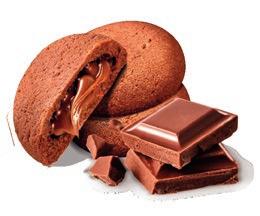












taste, tradition, and a modern approach to production. Our customers worldwide appreciate this approach, and we are proud to offer them products that are not only delicious but also trustworthy.
60% of the confectionery produced is exported abroad. Can you tell us which markets are key for the company and where you see great potential for further development?
We operate in over 50 markets worldwide. Key markets for us include Western Europe, the Arab countries, and the Far East. However, we see great potential in the Americas – both Latin and North America – where we still have room for growth. These markets continue to offer opportunities, particularly in the premium confectionery segment, which is gaining strength. We are also focusing on developing new product lines, such as wafer rolls, fingers, and jaffa cakes, which we plan to expand in these regions.
What do foreign consumers value the most about Polish sweets?
Foreign consumers particularly appreciate Polish sweets for their authenticity and high quality. Poland is associated with confectionery traditions, and our products, such as fudge and crunchy cookies, are seen as made from the finest ingredients. It is often said that Polish sweets combine simplicity of flavor with excellent quality. Moreover, consumers in many countries notice that Polish products have a unique character – they are balanced, tasty, and in many cases, less processed than some foreign counterparts.
You actively participate in international industry events. Recently, you took part in the Poland Festival in Indonesia, SIAL in Paris, and ISM Middle East in Dubai. What importance do these events hold for the company?
Participation in international industry events is extremely important for us because nothing can replace direct product presentation and the opportunity for potential customers to taste it. Trade shows are an excellent opportunity to connect with local distributors, reliable partners, and consumers. Thanks to these events, we can present our offer, observe the trends dominating the market, and learn about the preferences and expectations of consumers from different parts of the world. Direct interaction with the audience allows us to better understand what catches their attention in each region, which in turn influences our future product decisions and development strategy.


We operate in over 50 markets worldwide. Key markets for us include Western Europe, the Arab countries, and the Far East. However, we see great potential in the Americas – both Latin and North America – where we still have room for growth.
What are the biggest challenges for confectionery manufacturers in the Polish and international markets?
The confectionery market is changing very dynamically, and one of the main challenges, both in Poland and internationally, is the competition for shelf space. Retail chains are increasingly promoting their own brands, which limits space for smaller producers. Another challenge is the instability of the raw material market, which leads to difficulties in forecasting prices and availability. It’s also worth noting that large players are investing heavily in innovations and promoting new products, which requires us to be constantly flexible and responsive to changes.
Our plans for 2025 are a continuation of our current strategy. We want to strengthen our presence in markets where we are already established, but we will also invest in new, promising regions such as Asia and the Middle East. We will focus on further expanding our offer, particularly in the area of products that meet the needs of modern consumers, such as “fit” sweets or those with reduced calorie content. Technological development and sustainable growth will remain our priorities to meet the growing demands of the market and to be a responsible global manufacturer.
Thank you.








70 Karolina Street 32-608 Osiek, Poland +48 33 842 97 05 export@aksam.pl aksam.pl
Aksam is a Polish, family-owned company with 32 years of experience in the production of snacks. The Business started with the production of “Beskidzkie Paluszki” – salty baked sticks. Over the years, Aksam has expanded its portfolio to include other products, such as pretzels, and has been strengthening its position on the Polish salty snacks market year after year. Quality and safety are core values, which is why Aksam put them first. The products are of high quality, tasty, and contain the right ingredients. Aksam continuosly improve production and quality processes, train the Staff, and modernise machinery. The company holds certifications in food safety and quality: BRCGS, IFS, Halal, V-label and SEDEX.
In 2024, Aksam exported its products to 32 countries on every continent and continues to seek new destinations.
48 Gromadzka Street 05-504 Henryków-Urocze, Poland Export Department: export@bogutti.com +48 603 956 466, +48 601 704 404, +48 783 956 466 Internal Sales Dep.: zamowienia@bogutti.com bogutti.com
Bogutti is a family company from Poland which specialises in manufacturing high-quality cookies and fudges. The company is thriving and expanding into new markets on many continents.
Our sales focus on export, which makes up for 60% of the sales’ value. Bogutti owns brands: La Gustosa, Weeksy, Tweett, Choco Gutti, ChocoFit, Cookies in American Style, Next, Free. It is also the significant supplier for retail chains, both in Poland and abroad. The products are valued for their quality, impecable flavours and also for being kosher and halal.
18 Aleja Niepodleglosci 02-653 Warsaw, Poland +48 500 100 130 contact@bdgroup.eu bdgroup.eu
Brand Distribution Group is a global distribution leader with over 32 years of experience in the FMCG market. Specializing in sourcing and distributing high-quality food and non-food brands, we collaborate with international and local retail chains and manufacturers worldwide. With a strong foundation in proprietary stock management, advanced technologies, and strategically located sales offices in Poland, Spain, the United Kingdom, Germany, and Singapore, we ensure seamless operations. Employing nearly 200 professionals and communicating in 16 languages, we deliver a comprehensive distribution service, ensuring secure transactions and uninterrupted logistics processes for our partners around the globe.

meat spirits brewery

53 Kolejowa Street 22-500 Hrubieszów, Poland +48 884 848 191 handel@browarsulewski.pl info@browarsulewski.pl browarsulewski.pl
Founded in 2010, Sulewski Brewery is a unique gem in Poland’s craft beer scene. Located in a historic building in Hrubieszów, Lublin region, it blends rich brewing heritage with modern technology. Initially a small, family-run venture focused on reviving traditional beer flavors, it has grown into a renowned brewery celebrated by enthusiasts. To meet growing demand, a state-of-the-art brewhouse by Kaspar Schulz was built, enabling diverse, high-quality beer production. Sulewski Brewery stands out by merging time-tested recipes and natural ingredients with innovative techniques to create unique flavors. Beyond brewing, it’s a gathering place for beer lovers, with its historic pub offering freshly brewed beers and an inviting atmosphere. It’s where tradition and innovation come together.

48 Kowanowska Street 64-600, Oborniki, Poland +48 61 29 74 300 firma@cedc.com cedc.com
CEDC International since 2022 has been part of the Maspex Group. Company is the leader on the Polish vodka market and is one of the largest importers of foreign alcohol brands in the country. CEDC portfolio includes many recognised and beloved brands such as: Żubrówka (a brand with more than 500 years of tradition, number 3 by volume in global vodka sales, present in 86 markets), Soplica, Żytniówka and Bols. Apart from the brands that are produced at our plants in Białystok and Oborniki. Company is also licensed distributors on the Polish market for alcoholic beverage brands such as Grant’s, Glenfiddich and Tullamore D.E.W., Metaxa, Jägermeister, Cointreau, Campari, Aperol, as well as wines such as Carlo Rossi. CEDC production plants in Białystok and Oborniki feature some of the most modern rectification systems of their type in the world.
22 Opolska Street, 40-084 Katowice, Poland +48 32 731 10 00 marketing@duda.pl cedrobfoods.pl
For over 30 years, we have specialized in producing iconic Polish cold cuts. We manufacture high-quality products, including those from the renowned Duda brand, in five production plants with a monthly production capacity of 10,000,000 kg.
We are a leader in the meat industry and the fastest-growing company in the fresh food sector in Poland. Our product range is available in 40 countries worldwide, and each year, over 10,000,000 Poles purchase our products.
What sets us apart is our multi-billion scale operations and a fully integrated, modern, and unique farm-to-table production chain at the European level. The production of Cedrob Group, of which we are a part, encompasses feed preparation, integrated farming, and the production of meat, cold cuts, and ready-made meals.

eggs e-cigarettes distributor
25 Serwituty Street 02-233 Warsaw, Poland +48 22 343 98 70 sales@ewabis.com.pl ewabis.com.pl
EWA-BIS is a supplier of FRESH FRUITS and VEGETABLES. The company has over 36 years of experience in international business. We sell in Poland and all over EU, in the Eastern European market as well as overseas to Africa, Asia and North America. We know what the power of quality is and our work is all about delivering high-quality fruit and vegetables. We care about food safety, which is why we implemented IFS standards and the majority of our producers hold GlobalGAP certificates and Integrated Production Certificates.
Żylice 35 A, 63-900 Rawicz, Poland
Fermy Woźniak: office@fdw.pl / reception@fdw.pl +48 65 546 84 00 fdw.pl Eggs Product: sales@eggsproduct.pl +48 606 301 426 +48 600 922 979 eggsproduct.pl
Grupa Woźniak is a Polish family company founded in 1986 and specializes in eggs and eggs processed products. The Grupa includes the Fermy Woźniak company, a Polish pioneer in table egg production with operations globally, and Eggs Product, a manufacturer of high-quality egg-processed products with cutting-edge technology.
Fermy Woźniak offer includes:
- white/brown eggs
- breed: barn / free range/cage
- size: S / M / L / XL
Grupa Woźniak produces high-quality and technologically advanced egg-processed products.
10A Świętokrzyska Street 26-001 Masłów Pierwszy, Poland +48 797 259 733 grzegorz.sagan@fusion.pl fusion.pl
Fusion Labs is one of the largest Polish manufacturers of e-liquids and e-cigarettes, with nearly 10 years of experience in both local and international markets. Fusion Labs products account for 95% of sales in Polish specialty stores. In 2023, the prestigious ECigIntelligence Institute recognized 4 of Fusion Labs’ brands as leading Polish e-liquid brands. The company specializes in nicotine and nicotine salt-based e-liquids, bases, concentrates, and both disposable and reusable e-cigarettes with refills. Fusion Labs also provides comprehensive private label solutions, handling everything from product design to manufacturing and packaging for its clients. Known for its unique flavors, refined designs, and commitment to responsible industry development, Fusion Labs continues to lead the market.


3 Jesienna Street 10-370 Olsztyn, Poland +48 697 110 395 export1@indykpol.pl indykpol.pl/en
Indykpol is a modern brand with over 30 years of experience in the market, offering products made from turkey meat. The company offers a wide and complementary range of products, including turkey meat and preserves such as sausages, hams and pâtés.
Indykpol is an integral part of Drosed Holding S.A., which is part of the French LDC Group, a leader in the poultry industry.
The Indykpol Group is the largest organization of poultry companies in Poland, specializing in turkey breeding and fattening, as well as the production and sale of turkey meat and turkey meat products.
The company takes full responsibility for every stage of production, from feed manufacturing to store shelves.
Indykpol holds the following certificates: BRC, IFS and HALAL CORRECT.
Modła Królewska 5 Kaliska Street 62-571 Stare Miasto, Poland +48 63 244 20 64 biuro@konplast.com.pl konplast.com.pl
Kon-Plast Group is a Polish manufacturer of plastic products. We manufacture items for retail store equipment e.g. shopping baskets, poster frames, price tag profiles; household appliances such as buckets, containers, bowls and baskets; and large containers – palletboxes and crates. We operate within the framework of cooperation, providing injection moulding service on the client’s entrusted moulds. The diversification of the product range influenced the expansion of the machine park. Thanks to this diversification our experience in the production process has become richer. Our goal is continuous development to provide our customers with high quality products made in balanced way and in accord with European and world norms.

6 Kaszubska Street 14-300 Morąg, Poland +48 89 757 55 57 handel@lactima.pl lactima.pl
LACTIMA is a processed cheese producer from Poland. Our plant is based in Morag, in a Warmian – Masurian province, known as a thousand lakes area.
As the first Polish company ever to produce individually wrapped slices, since 1989 we managed to successfully cover all sales channels. Cheese slices, portions, spreads in cups and bars are available in many different tastes and formats. We also produce cream cheese, butter and margarine in small cups.
Our company works according to quality management systems PN-EN ISO 9001:2015, PN-EN ISO 22000:2018, BRC GLOBAL STANDARD for FOOD SAFETY and Halal to ensure highest quality of products. LACTIMA brand reaches not only Europe but also Middle East, Far East, Africa and both Americas.

13 Elewatorska Street 19-203 Grajewo, Poland
Export Department:
+48 86 273 04 44 +48 86 273 04 80 export@mlekpol.com.pl mlekpol.com.pl
Dairy Cooperative MLEKPOL in Grajewo is one of the biggest milk and dairy producers in Poland. It has been a leader on domestic dairy market for years and it is one of twenty largest dairy processors in Europe. Mlekpol’s milk purchase exceeds 2 billion liters per year. This equals to over 5,5 milion liters of milk per day supplied by around 8 000 farmers – members of the Cooperative. Its main product categories are UHT products, cheese, butter, milk and whey powders. Mlekpol’s products are made in 14 modern production plants. They are known by, among others, European, African and Asian countries. Mlekpol’s export sales are growing systematically each year.
48 Strażacka Street 44-240 Żory, Poland
+48 32 434 97 00 export@mokate.com.pl mokate.com
MOKATE stands for passion, tradition, and innovation.
As a family-owned company, we blend generations of experience with modernity to deliver high-quality products worldwide. Our portfolio includes aromatic coffee, tea, healthy snacks, innovative meat substitutes, and more. Exporting to nearly every corner of the globe, we prioritize quality, growth, and staying true to our family heritage. Explore our world of flavors and aromas – crafted with care and precision.
MOKATE – Tradition, Innovation, Quality.
14 Chlebowa Street 44-337 Jastrzebie-Zdrój, Poland +48 32 47 33 833 export@prymat.pl prymat.pl
Prymat Group is the leading spice and seasoning producer in Poland with our Prymat and Kucharek brands. We are also an experienced manufacturer of processed, wet and dry vegetables – under the Smak brand. We deliver products to all key international supermarket chains, both Polish and foreign ones, to HoReCa industry and B2B. With the quality of our products in mind, we work in accordance with the highest quality standards: IFS and Halal. Our R&D and quality department develop products that meet the needs and requirements of consumers. All are compliant with standards and competitive in terms of flavour combinations and quality.
Our products are available in many countries such as Australia, China, USA, United Kingdom, Spain, Sweden and even in Senegal or Indonesia.


61 A. Struga Street 90-959 Łódź, Poland
+48 42 208 52 52 biuro@unitop.com.pl unitop.com.pl
Since 1945, the smell of tempting sweetness emanating from the Unitop Sp. z o.o. factory, known for its attention to tradition and quality of sesame products, has been wafting through the heart of Lodz. In 2022, Unitop joined the prestigious Sweets House Group, which also includes Majami Sp. z o.o. - a leading manufacturer of fudge, sesame, chocolate-covered creamers and jellies. Currently, Unitop sp. z o.o., together with Majami sp. z o.o., are the largest producers of halva and sesames in Europe, selling their products worldwide.
Unitop is currently focusing on new directions of development, exploring the functional food market and the production of nut and breakfast bars.
78 Podgorna Street
87-300 Brodnica, Poland
+48 56 493 28 51
export@vobro.pl vobro.pl
VOBRO was established in 1986. The company employs over 300 people, most of them are long-term employees who present vast experience and have been associated with the production of sweets form many years.
The VOBRO company is known preliminary for its production of chocolate sweets – including chocolate pralines. FRUTTI DI MARE (seafood-shaped pralines), as well as CHERRY PASSION and LOVE & CHERRY (cherry pralines in chocolate) brands are products known to chocolate praline consumers in markets around the world. A large part of the company`s products are chocolate candies and chocolate bars – including the very popular TRUFLA and JAMAJKA brands. For several years, the company has also been investing in other types of sweets: jellies, including new brand JELLY DOT and different formats of bars. The VOBRO brand is a leader in many markets in term of the occasional products offer, i.e. products bought by consumers as calendar occassions (Valentine`s Day, Mother`s Day, Christmas, etc.).
14 Władysława Warneńczyka Street 30-520 Cracow, Poland +48 669 222 356 export@wawel.com.pl wawel.com.pl
WAWEL SA is one of the most renowned Polish confectionery producers. It offers a wide portfolio of chocolate tablets, chocolate bars and pralines, candies, caramels and fruity jellies. Wawel owes its success to over a century of experience along with continuous development and modern production process. Permanent care for high quality and global standards resulted in exceptional growth and development. Today Wawel’s products are available in about 50 countries worldwide and the number of loyal customers is constantly growing.
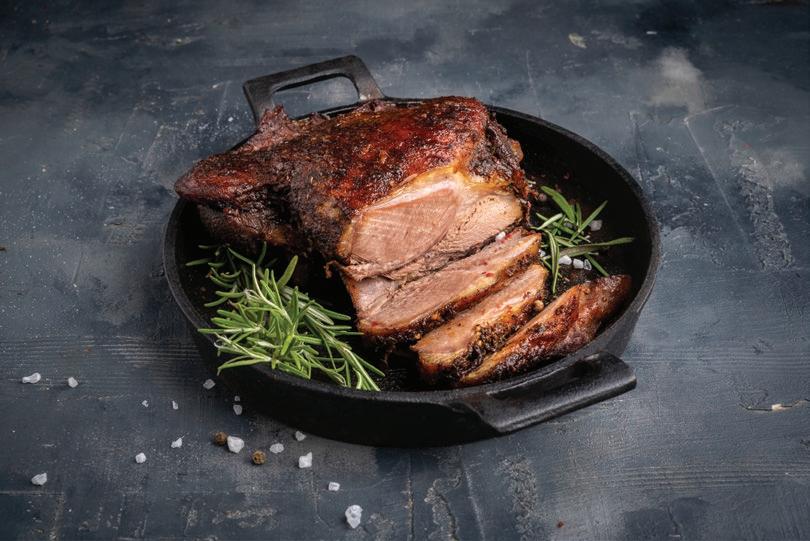





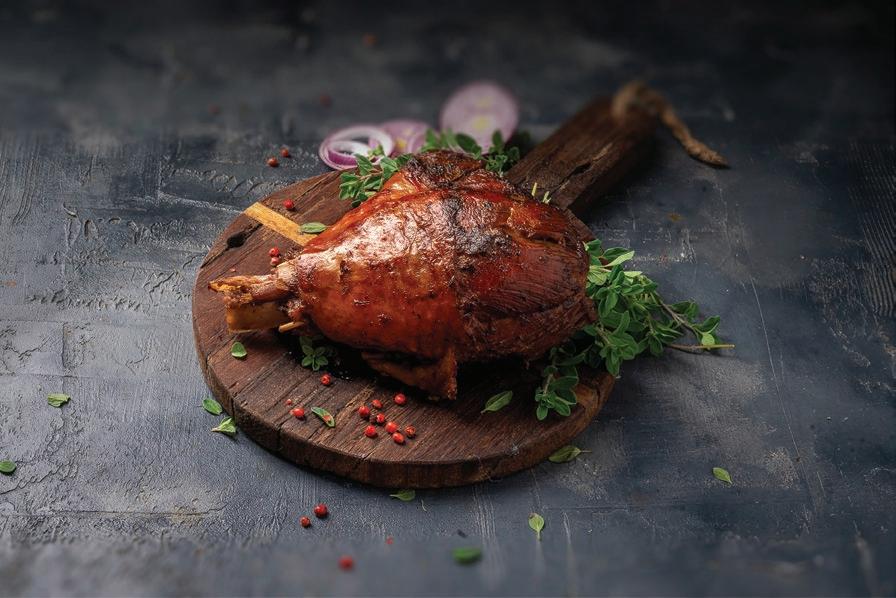






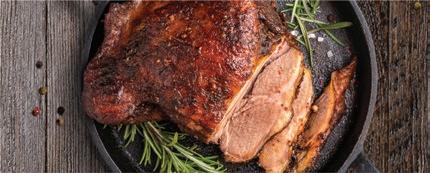
This blend features a captivating floral aroma that enchants the senses. Each sip unveils a bouquet of fragrant flowers, creating a bold yet inviting experience. The rich, exotic scents and flavors transport you to a world of sensory delight, making every taste a unique journey through nature’s finest blooms.
www.MOKATE.com
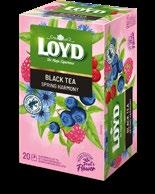

Available in a convenient tube
– Duda Premium Chicken Paste – is the brand’s response to current consumer trends towards light, conscious eating, while also being quick and easy to use.
This innovative product takes consumers to a higher level of taste, offering three flavors to choose from: classic, with boletus, and with chili.
www.PASTADUDA.pl
Slow-cooked meat is cooked for a few hours in vacuum packaging at a temperature of approx. 85°C. It is quick and easy to prepare – 25 minutes; tasty, tender and juicy and aromatic – spices and herbs penetrate deep into the meat. What is more, it is full of preserved nutritional values with a long shelf life of 90 days.
Perfectly composed mixtures of herbs and spices, as well as various marinades are used in Sous vide/Slow-cooked meats.
Sous vide/Slow-cooked turkey elements include:
• Turkey breast fillet
• Turkey tenderloin
• Turkey thigh and thigh meat
• Turkey knuckle
• Turkey gizzards
• Turkey liver
www.INDYKPOL.pl/en
The creamy Toffee Nut Latte blends the rich flavors of caramel and roasted nuts. Its velvety texture with a layer of creamy foam is pure comfort in a cup. Ideal for those crisp autumn evenings when all you want is to relax and enjoy the cozy vibes!
www.MOKATE.com

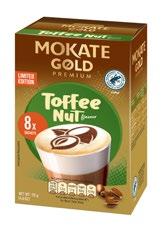
Cedrob Foods S.A. has expanded its Duda High Protein line of cold cuts to include ready-made meals. The producer aims to redefine the concept of fast food, as Duda’s version is indeed quick – that part is consistent. However, it differs from the commonly known fast food in one key aspect: it is simply healthy, based on a clean-label approach. Thanks to the use of unique production technology, demanding consumers will find exactly what they are looking for – maximum nutritional value from Polish poultry meat and vegetables, without the use of fortification.


Delissimo Almond are delicate pralines, full of expressiveness and refined elegance. The packaging, perfectly in line with global de sign trends, conceals pralines in the form of spheres with a whole almond submerged in a delicious white cream. It is impossible to tear yourself away from them, as they seduce you with every bite with their velvety, almond-coconut flavor. www.VOBRO.pl
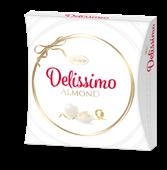
This novelty from Vobro will make happy fans of fruity pleasures! The delicious Pralines Plum in Chocolate stands out not only for its exquisite taste, but also for its unique plum shape, hiding a plum flavored filling and a whole plum inside. Each praline is packaged in an elegant purple wrapper, decorated with an appetizing image of a juicy plum coated in chocolate. Product is available in two formats: 144 g carton box and 192 g gifting packaging with a real rosette.



Flavoured vodka. Each bottle contains a blade of bison grass added by hand, giv ing Żubrówka its unique and aromatic taste. A taste of real nature. Żubrówka Bison Grass is the world’s Number 3 vodka and prolific gold medal winner. The legendary Żubrówka story started over 500 years ago in the pri meval Białowieża forest. A forest that makes up Europe’s invaluable green lung. A world heritage site protected by UNESCO where Europe’s last remaining herds of wild bison roam free and where wild bison grass grows in the glades.
www.CEDC.com
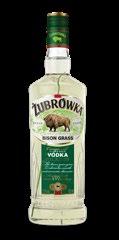
Wafer rolls with chocolate
cream
• Crunchy wafer
• Soft cream
• High-quality cream
• Net weight: 120 g
Wafer rolls with vanillia cream
• Crunchy wafer
• Soft cream
• High-quality cream
• Net weight: 120 g
www.BOGUTTI.com

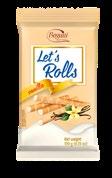
www.VOBRO.pl
New Soplica Szlachetna represents the pinnacle of vodka excellence. Meticulously crafted, it captivates with its purity and delicate profile, built on the finest grain spirit.
Its distinguished character stems from carefully selected grains, creating a unique and refined flavor. The crystal-clear consistency is achieved using only natural ingredients and a state-of-the-art distillation process. With 40% alcohol content, Soplica Szlachetna is the perfect companion for sophisticated celebrations or as a base for timeless cocktails.
www.CEDC.com

Vanillia & dark chocolate
• High-quality ingredients
• Net weight: 100 g (3.53 oz)
Salted caramel
• High-quality ingredients
• Net weight: 100 g (3.53 oz)
www.BOGUTTI.com


Enriched with wild rose and collagen, it’s the perfect way to combine indulgence with self-care! This unique small chocolate bar by Wawel pairs perfectly with an espresso or serves as a sweet treat during the day – whether enjoyed solo or shared with company. Packed with 100% of the daily recommended value of vitamin C for adults, it supports your daily balance. Free from E476, artificial colors, and flavors – just a simple, pure recipe you can always keep on hand. Small, convenient, and bursting with flavor.
www.WAWEL.com.pl

Discover a unique pairing of flavors that combines classic, creamy milk fudge with Wawel’s exquisite chocolate. The product’s flavor is inspired by one of the most popular and well-known Cream Fudge brand from Wawel, known for its exceptional composition. This small masterpiece of taste evokes memories of carefree childhood, conveniently wrapped in the form of a chocolate bar. Perfect to enjoy anytime, anywhere – at work, at school, or during moments of relaxation. A delightful snack that pampers your taste buds at any time of day!
www.WAWEL.com.pl


EWA-BIS operates globally in the FMCG bussines. In our portfolio you can find the most respected global brands such as: Procter & Gamble, Henkel, Unilever, Adidas, Mars, Mondelēz International, Nestlé, Ferrero, Red Bull, Monster, Coca Cola and many others.
We try to reach out to our customers every day, offering them brands, which are recognized around the world, regardless of the place in which they are located. We cooperate with large retail chains, distributors, as well as intermediaries. Very much of our attention is focused on reliable service, which is why we provide labelling, repackaging, mixing pallets, cargo manual and trucks. Due to the growing demand for dairy products in Asia, the Mid-dle East and Africa, Poland has significantly increased exports in recent years and today is recognized as global exporter of dairy products. The dairy export department of Ewa Bis is a team of experi-enced traders supported by a specialized logistics depart-ment. Thanks to our knowledge and willingness to develop, we reach every continent with dairy products (powders, fats, cheeses, UHT Milk). www.EWABIS.com.pl
The perfect snack that proves that healthy can also be delicious! With a combination of sesame, honey and valuable additives like amaranth, quinoa, buckwheat and millet, they offer natural sweetness and a host of health-promoting properties. Available in 30g, packaged in a display of 12 pieces. Now you can enjoy the taste of sweets that support health!
www.UNITOP.com.pl
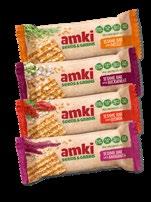
Halva is a trademark of Unitop sp. z o.o. - handmade, without palm oil, from the highest quality ingredients, which ensures its unique taste and excellent texture. It is available in a wide range of flavors, including vanilla, pistachio, nuts or chocolate covered. It is offered in a variety of forms to suit customers’ needs: as handy 50g and 100g bars, elegant gift halva cakes, larger kilogram blocks, and in a mini version - ideal for those looking for small, sweet pleasures. Unitop halva is the perfect choice for any occasion - it combines tradition, taste and quality!
www.UNITOP.com.pl
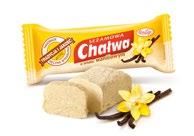



Whey protein concentrate 80 is a product obtained by the separation of the whey protein from the pasteurized liquid whey in the ultrafiltration process so that the finished pro- duct contains at least 80% protein.
Mozzarella is a cheese with a mild and delicate flavour. It is perfect for baking and, which is distinctive for it, after melting it becomes flexible and very stretchy, which makes it the most popular choice for making pizza.
www.MLEKPOL.com.pl

Processed cheese portions are the excellent spreads for bread and the tasty, creamy snacks. In a 140 g or 120 g pack there are 8 delicious triangular portions. Every portion has a special ribbon for easy opening.
www.LACTIMA.pl

The boxes are made of high quality polypropylene, which is environmentally safe and destined for food contact. Crates can be easily washed with water and detergent and dried thoroughly before being reused. The „ergo-lock” folding mechanism allows quick closing and unfolding, providing an effective and efficient solution for storing and transporting fresh food, while maximizing the use of available space and facilitating logistics.
www.KONPLAST.com.pl

Soleo Salty Snacks are baked products that will appeal to everyone. All made with top quality ingredients, our snacks are available in the form of sticks, pretzels and a tube combining both the products. All snacks listed are vegetarian friendly, which is confirmed by the European V-Label Vegetarian certificate. They do not contain monosodium glutamate.
www.AKSAM.pl


High quality product produced with modern technology based on carefully selected raw materials and is targeted to a wide range of consumers. Each slice of cheese is individually wrapped in plastic foil, which is a great help in preparing the sandwiches at home, as well as outdoors. Slices can also be used to prepare toasts and snacks. Some packaging of the slices is designed to allow multiple opening and closing, which helps to extend freshness of the product. Excellent taste and high nutritional values of the slices make the local as well as foreign consumers buy them for many years.
www.LACTIMA.pl
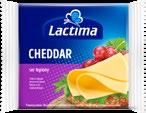
The pallet crate is ideal for storing and transporting large quantities of fruits, vegetables and other products. It is made from original HDPE material with a food contact certificate. The palletbox is available with perforated or full walls. The pallet crate comes in 2 or 3 skids or 4 feet. Standard colors of the palletbox are green with the possibility of production in any other color from RAL and Pantone color pallet.
www.KONPLAST.com.pl



5 liters of exceptional beer for special occasions. Our lager is more than just a drink; it’s a symbol of hospitality and friendship. Its golden color, rich aroma, and full flavor will make any gathering unforgettable. Perfect for birthdays, anniversaries, and other important events.
www.BROWARSULEWSKI.pl

Eggs Product Company is a Polish producer of high-quality and technologically advanced egg processing products – powders and liquids, intended for the FMCG and HoReCa sectors, for the B2B sector profiled for the food market. Eggs Product brand is a part of Grupa Woźniak – a Polish family company established in 1986, specializing in eggs and egg products available worldwide. www.EGGSPRODUCT.pl

Lager is a delicate balance of malt sweetness and bitterness. The use of noble aromatic hops from the Hallertau region in Bavaria introduces herbal and spicy notes, giving it a classic Bavarian beer character. This is our flagship beer.
www.BROWARSULEWSKI.pl

Fermy Woźniak is a Polish family company with more than 35 years of experience in the production of table eggs. Ranked among the largest producers in Europe, it is also present in global markets. The company’s priorities have always been high product quality and respect for natural resources in optimizing the production process along with sustainable development.
www.FDW.pl

Universal vegetable seasoning is a versatile blend of carefully selected herbs, spices, and dried vegetables, perfect for enhancing the flavour of a wide range of dishes. Whether you’re preparing soups, sauces, meats, or vegetables, this seasoning adds a rich, balanced taste and aroma. Its convenient packaging ensures freshness and ease of use, making it an essential in every kitchen. www.PRYMAT.pl
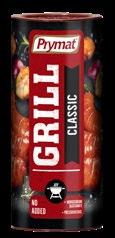
Grill Seasoning is an excellently crafted blend of herbs, spices, and dried vegetables. The refined taste and aroma of the seasoning perfectly enhance the flavour of meat dishes prepared on the grill or in a pan. The tube packaging allows for convenient and economical use of the seasoning, letting you enjoy its aroma for longer.
www.PRYMAT.pl

